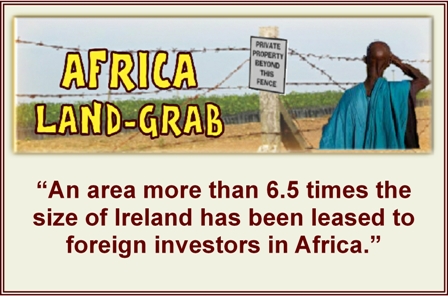Fr Nelson Adjei-Bediako, from Ghana, is an SMA priest. During his seminary years he spent time studying and working in his home country as well as in Benin Republic and Egypt before his ordination in 1998. Until 2007 he was on mission in Nigeria. When the SMA decided to create three distinct African units, Fr Nelson was appointed as Superior of the Gulf of Guinea District-in-formation, living in Lomé, Togo. In this capacity he was responsible for SMA priests from Burkina Faso, Ghana, Ivory Coast, Liberia, Sierra Leone and Togo. As Superior Fr Nelson visited his priests working in many African countries, including the Central African Republic (CAR). One of them is now Bishop of Berberati, Msgr Dennis Agbenyadzi SMA.
Since handing over to his successor, Fr Nelson has been involved in a new parish development in Accra, Ghana (see photo below taken at the first Mass in a temporary Mass centre). He is now heading to a new fulltime parish appointment in Lomé, Togo.
Those visiting our website will be familiar with the ongoing violence in the Central African Republic, where the SMA has both members on mission and members from that country on mission elsewhere in Africa.
In light of his visits and speaking with people in CAR, Fr Nelson has written an evaluation of the situation in CAR and the prospects for peace, as part of his studies in International Relations & Conflict Resolution. This article is based principally on his work.

Introduction
Today we are witnessing a strong and promising economic growth in most parts of Africa; yet the continent is still struggling with pockets of instability and violent conflicts.
In the Horn of Africa, Somalia’s militant Islamist group al-Shabaab is resisting African Union military forces (AMISOM) and gained even greater notoriety for its terrorist attack on a Nairobi shopping mall.
The Democratic Republic of Congo is still saddled with violent insurgents despite the surrender of its M23 rebel group in November 2013.
West Africa continues to witness attacks by Boko Haram and other armed groups in Northern Nigeria, and the rapidly deteriorating humanitarian situation in the Central African Republic has made the United Nations officials recently signed a warning against the potential for another Rwanda.1
In this article I am examining the conflict in Central African Republic and the possibility for peace.
The Central African Republic (CAR) has a population of 4.6 million (UN, 2012) and covers an area of 622,984 sq km (240,535 sq miles) with Bangui as the capital city. Life expectancy is 51 years for women, 48 years for men (UN). The people are Christian [50%], Muslim [15%] and indigenous beliefs [35%]. CAR is surrounded on all sides by conflict-affected countries. The conflicts and insecurity in these countries – DR Congo, Sudan and Chad – have all spilt over the porous borders into the CAR.
The country and its conflict attracted little interest from the media or governments until recently when the UN warned of a possible genocide there. The UN described the situation in CAR as the ‘world’s most silent crisis’.
There is the dire need for international assistance as it ranks as one of the least developed countries in the world and has some of the lowest income and school attendance rates. The Séléka rebels’ coup in December 2012 launched the country into further turmoil which has affected the entire population of about 4.6 million. At least 200,000 families have been forced to flee their homes, and as a result, over 60,000 children and families are suffering from severe food shortages.2
Background History
The Central African Republic has experienced instability since its independence from France (1960). It is one of the least developed countries in the world, ranking 159 out of 169 in the 2010 Human Development Index (HDI) and in United Nations Conference on Trade and Development (UNCTAD) 2012 & 2013 reports on the Least Developed Countries.3
Who is involved in the conflict
The government of President Bozizé of CAR had become quite weak, and so began to lose control over the territory except the capital, Bangui. Three main rebel groups had been operating in CAR over the last few decades: the Convention of Patriots for Justice and Peace (CPJP); the Union of Democratic Forces for Unity (UFDR); and the Popular Army for the Restoration of Democracy (APRD).
There have been also other smaller rebel groups operating in the country, most specifically in the north. The situation is further complicated by a long history of neighbouring militias launching raids on CAR territory, particularly Uganda’s Lord’s Resistance Army (LRA), who are known for brutal attacks against civilians, and is often pursued by the Ugandan Peoples Defense Force (UPDF).4
When it all started
Before independence the country was called Oubangui-Chari. Post-independence it became the Central African Republic. Since independence, the country has not really known peace due to the fact that military leaders began to stage coup after coup in order to take power from the previous leaders. From 1976 – 1979 CAR had an Emperor, Jean-Bédel Bokassa, who gained infamy for his extravagant lifestyle etc. Bokassa had seized power ten years previously and ruled as President until he decided to declare CAR an Empire. He was overthrown by French troops who reinstated David Dacko, the man he had overthrown 23 years previously.
But this did not bring peace and power struggles between competing factions in CAR continued. In 1993 the first fair and democratic elections were held with Ange-Felix Patasse being elected as president. Unfortunately, his terms in office witnessed several mutinies and a series of riots by civil servants and soldiers over the non-payment of salaries. In 2003 Patasse was ousted by Francois Bozizé, who was backed by the UFDR, and took over the control of Bangui.
As a result of this coup, together with the overspill from the Sudanese war, a civil war began involving the UFDR, who took control of several towns in northern CAR. As fighting between the UFDR and CPJP in the north intensified, Bozizé lost control of some parts of the country. This crisis continued well into 2007, with nearly 300,000 citizens displaced. 5
In 2008, the UFDR and APRD signed a peace agreement with Bozizé’s government, and promised to disarm and demobilize rebel fighters. However, the CPJP remained active, mainly in the north of the country where it was constantly attacking the Central African Army, as well as the civilians in the region.
Clashes between government forces and rebel groups continued despite peace agreements and ceasefires that were being signed by most rebel groups in the country. The LRA also continued to step up its attacks on CAR territory, and terrorized much of the area. The Presidential Guard and the Central African Army were being accused, as the same time, of committing serious violations against civilians, reportedly burning schools and homes. In January 2011, Bozizé was re-elected for a second term but was forced into exile by rebels in March 2013.
The ongoing conflict and years of political instability has adversely affected the economy of CAR, and over 20% of the population has fled their homes. CAR relies heavily on international aid and NGOs for money, and for services which the government cannot provide for its citizens.6
Séléka (also called the Séléka CPSK-CPJP-UFDR) means ‘alliance’ in Sango, the national language of CAR. It is an alliance of militias7 in CAR that overthrew the government on March 24, 2013.8 Séléka leader, Michel Djotodia, proclaimed himself President. Nearly all the members of Séléka are Muslim.9
The rebel coalition brings together factions of the Convention of Patriots for Justice and Peace (CPJP) and the Patriotic Convention for Saving the Country(CPSK), two of the CAR’s many anti-government militias. CPJP in this case refers to the “Fundamental” splinter group of the Convention of Patriots for Justice and Peace, one of many militias involved in the CAR’s long-running civil war. A different faction of the CPJP signed a peace accord with the government on 25 August 2012.
The Séléka first emerged on 15 September 2012 under the name CPSK-CPJP Alliance, when it published a press release taking responsibility for attacks on three towns that day. It was the last of the major rebel groups to do so. The Patriotic Convention for Saving the Country (CPSK) was previously hardly known.
On 15 December 2012 the group published its first press release using the full name “Séléka CPSK-CPJP-UFDR“. Two groups that do not appear in the title, the long-standing militia Democratic Front of the Central African People (FDPC) and the newly minted Alliance for Revival and Rebuilding (A2R) were reportedly part of the alliance.
In September 2013 Michel Djotodia announced that Séléka had been disbanded. The group dispersed into the countryside and, since then, has been committing mass atrocities according to Human Rights Watch. Executions, rape and looting by ex-Séléka fighters after the coup and disbanding have fomented religious tension where the population is over 50% Christian. Christian militias, using the name anti-balaka, have been formed to fight the Muslim Séléka. The United Nations considered sending troops to stop the atrocities. On 26 November 2013, France indicated that it would boost its presence by deploying a further 1,000 troops to augment its existing 400 troops if it receives UN backing.10
Anti-Balaka
Anti-balaka denotes the Christian militias formed in CAR after Michel Djotodia came to power. Anti-balaka means “anti-machete” or “anti-sword” in the local Sango and Mandja languages. Michel Djotodia was the leader of the mostly Muslim rebel coalition known as Séléka that overthrew François Bozizé in March 2013. Djotodia became the first Muslim leader of the country. The increasing violence in the country is largely reprisal attacks on civilians from ex-Séléka’s mainly Muslim fighters and the anti-balaka. As many Christians had sedentary lifestyles and many Muslims were nomadic, claims to the land were yet another dimension of the tensions. In November 2013, the UN warned that the country was at risk of spiraling into genocide, was “descending into complete chaos” and France described the country as “…on the verge of genocide” On 2 December, anti-balaka militiamen were suspected to have killed 12 people, including children, and wounded 30 others in an attack on the mostly Muslim Peuhl ethnic group in Boali, according to the government.11
Civil War Turning Religious?
The conflict is escalating daily into a religious war that’s hampering the effectiveness of international aid, according to a chief UN envoy. “As a result of its predominantly Muslim composition, Séléka abuses against the Christian populations in the CAR were quickly interpreted as a religious conflict pitting Muslims against Christians,” UN Undersecretary-General for Political Affairs, Jeffrey Feltman, said in a statement.12
The worsening strife in the country with its Muslim-Christian overtones risks escalating into sustained violence along religious lines and this could spill beyond the country’s borders, further destabilizing the entire region.
“Killings in Bangui (the capital) and in the rest of the country continue every day, and the population remains divided along religious affiliation,” Under-Secretary-General for Political Affairs Jeffrey Feltman told the Security Council in a briefing on 6 January 2014. He said that thousands of people are estimated to have been killed, nearly 1 million driven from their homes, and 2.2 million (about half the population) need humanitarian aid.
“Access to residential neighbourhoods in Bangui is controlled either by ‘anti-Christian’ or ‘anti-Muslim’ checkpoints, manned by armed civilians. Similarly, places outside Bangui like Bossangoa, Bouar, Bozoum and Paoua, among others, witness atrocities on a daily basis, including direct clashes between the Christian and Muslim communities.”13
Political not Religious Conflict
The situation in CAR is critical because it’s beginning to confirm the notion that people have on the African continent because of what’s happening in Nigeria where there seems to be practically a schism between Muslims and Christians who have existed together in many African countries for years with no problem. The horror that is going on particularly in the capital, Bangui, is terrible.
People watched in horror as militiamen rush through houses and looked for Muslims to shoot them dead or hack and club them to death. The two-day frenzy of violence in Bangui in December, in which militia killed 1,000 people according to Amnesty International, brought fears that the Central African Republic was about to descend into religious warfare on a level comparable to Rwanda’s 1994 genocide.
The heinous attack was a vengeful response to months of atrocities committed mostly by Muslim fighters from the Séléka rebel group who seized power in March, which compelled the prompt intervention of France who deployed 1,600 troops under a UN mandate to protect civilians.14
Religious leaders had sounded the alarm over abuses by the Séléka after they burned churches, looted and killed during their march from the north towards the capital in early 2013. Many in the country will strongly disagree with the view that the origins of the bloodshed have something to do with religion, because Muslims and Christians in this country have long lived together in peace. They blame rather a political struggle for control over resources in one of the weakest states in Africa.
The militia, known as anti-balaka, carried out these reprisal attacks mainly because according to them the country has been invaded by foreigners, especially from Chad and Sudan. For them the group’s aim was purely political: they would fight on to oust the Séléka leader, Michel Djotodia, installed as interim president.15
Rich in diamonds, timber, gold, uranium and oil, the Central African Republic has been racked by five coups and numerous rebellions since independence as different groups fought for control of state resources. That, and the spillover from conflicts in neighbouring DR Congo, Sudan and Chad, has disregarded the rule of law, leaving a phantom state with an ill-disciplined army, corrupt administration and a lawless interior.
Djotodia and other Séléka leaders launched their uprising to gain access for northern peoples to the nation’s wealth, particularly oil, found in their northern homeland and now under the control of the China National Petroleum Corporation.
Djotodia says his northern Gula tribes people, Muslim pastoralists neglected both under French colonial rule and post-independence governments, were betrayed by former President Francois Bozize, who sought their aid for a 2003 coup but surrounded himself with his Gbaya tribe once in power.16
With support from battle-hardened Chadian and Sudanese fighters, many of them also Gulas, Séléka swept southward, overrunning not only Bozize’s poorly equipped troops but also a South African peacekeeping force in March 2013.
Once in Bangui, unable to speak French or the local Sango language, Séléka fighters sought out Arabic-speaking Muslims and stayed with them, often hoarding looted goods in their homes.
Non-Muslims equated this with complicity, said Archbishop of Bangui Diedonne Nzapalainga, with the devastating effects seen in the early December violence until today.
“To non-Muslim locals, Muslim now equals Séléka and Séléka equals Muslim,” said Nzapalainga, who for months has worked with Muslim clerics to try to calm rising religious tensions. “We came out early and declared that this conflict was not a religious conflict but a political one.”17
The Role of the International Community
It is always impossible to describe the scale of international failure when you look at the conflicts in Rwanda, in Darfur and today in Syria. Prominent commentators and writers have therefore commented that “in general at the UN, conflict prevention is preached more often than it is practiced.” 18
To prevent such atrocities the international community must tackle the root causes of these conflicts. For example, groups are often labeled as inhuman by describing them as sub-human – this includes terms such as inferior races and animals. Tutsis were called cockroaches in Rwanda during the genocide in which more than 800,000 people were slaughtered in a three month period. Some citizens are not considered citizens but foreigners in CAR and in other states. Once the other has been delegitimized, no longer considered as fellow human beings but rather something less and not worthy of life and liberty, the end result is often brutal with the best case being the suppression and violation of human rights and the worst case being mass atrocities and genocide.19 In the case of CAR groups such as Séléka and Anti-Balaka should either be disbanded completely or be made to reconcile with each other.
The International Community’s seemingly inaction, in the face of violation of human rights, is due to the UN Charter under Article 2.4 which states that “all Members shall refrain in their international relations from the threat or use of force against the territorial integrity or political independence of any state, or in any other manner inconsistent with the purposes of the United Nations.” There are two exceptions to this blanket prohibition.
First, as provided by Article 51 of the Charter, states may act in self-defense.
Second, under Articles 41 and 42, the Security Council can authorize enforcement actions and allow for the Security Council to take measures by air, sea, or land forces to maintain or restore peace and security.20
So with the authorization from the Security Council, French and African Union (AU) troops are presently in CAR to protect lives and property and to curb the atrocities taking place there.
In 2000, former UN Secretary General Kofi Annan, in response to the atrocities in Rwanda and troubled by the “confusing legal justifications surrounding NATO’s intervention in Kosovo… asked the General Assembly the following: ‘If humanitarian intervention is, indeed an unacceptable assault on sovereignty, how should we respond… to gross and systematic violations of human rights that offend every precept of our common humanity.’” The government of Canada, in response to Kofi Annan’s inquiry, brought together the International Commission on Intervention and State Sovereignty (ICISS) to develop a report on the a range of moral, political, and legal issues concerning humanitarian intervention. The final report produced by the ICISS and endorsed by the UN Secretary General in 2005, introduced the concept now widely known as “the Responsibility to Protect” (R2P) – a comprehensive framework for diplomatic and economic sanctions and finally military interventions as a last resort to prevent gross human rights violations21, the latter being applied in the CAR today.
The most difficult and controversial principle to apply is that of “right authority”. When it concerns authorizing military intervention for human protection purposes, the argument is compelling that the United Nations, and in particular its Security Council, should be the first port of call. The timely intervention of France in northern Mali and Central Africa Republic (CAR) has saved so many lives and has avoided another imminent and catastrophic genocide especially in the CAR although the situation is not fully contained. In the case of Syria, the silly nature of the guerrilla fighting and the growing sectarian ties of both the rebels and government forces make a potential military intervention extremely difficult.22
Prospects for Peace – Way Forward
Despite the concerted, determined efforts of the UN and the AU backed French forces, no peace has emerged yet. Despite the resignation of the coup leader, Djokoto, and the setting up of an interim government headed by Catherine Samba-Panzathere is still no peace in the country.
This “civil-turned-religious conflict”, compared to other conflicts, has not lasted too long but has had a huge amount of devastating consequences, human and material, that many no longer believe that a solution can be found. However, with the assured commitment of the interim government, prospects for eventual peace can be guaranteed.
The key to resolution is very easy to state, but extraordinarily difficult to achieve.
It needs the total commitment of all Central Africans and the government, with the active participation of the International Community and the many other NGOs and entities that want to help.23
It’s not a conflict between Christians and Muslims. The Central Africans feel they are undivided one nation, but it was discrimination that led to the coup. Muslims were viewed as foreigners in the capital but they have rights as well.
Resolution to this conflict, if all parties agree, is this: commitment to the task of reconciling all, especially Muslims with Christians. Security is what the Central Africans don’t have for themselves, even though security for all is in the general interest for all.24
Present indications are that hostilities are likely to continue, unless all the parties involved in the previous agreements, their guarantors and the Central African civil society re-dedicate their commitment, deciding to find a lasting solution to the political problems in CAR, re-engage in dialogue on outstanding issues and develop a clear implementation plan that includes
(a) representation from all sections of the population,
(b) commitment to a longer term peace process and
(c) setting up of an independent monitoring mechanism to track progress and agree on a joint and peaceful path to recovery.25
The people of CAR must take the decision themselves, with the help of the International Community. It must not be imposed from beyond. They must understand by now that the destiny of the country rests in their own hands.
The style of dialogue that needs to be adopted should be inclusive (all Central Africans) and they must dialogue on the key issues that have caused a succession of rebellions in their country: centralized governance; political exclusion; persistent failure to implement previous peace agreements; lack of development projects; poor public services, and cross border conflict dynamics.
Thus the existing problem is due to a dispute over who should be in power and be in charge of the country’s resources. Yet all sides thus have a strong incentive to resolve the problem. Central Africans want peace and an end to the conflict, to regain the country’s peaceful existence, and enjoy the benefits that would accrue as a result of promoting normal relations among themselves and with their neighbors. The ordinary people are suffering from poor living standards and violence. Their lives are miserable. Naturally they want to find a way out of this situation as quickly as possible.26
Like George Mitchell who talked about the Israeli-Palestinian conflict, I am optimistic that there will be a resolution sooner or later in the conflict. But it cannot be imposed externally. The parties themselves must negotiate directly, with the active and sustained support of the UN and the AU.
All recognize and acknowledge the need to settle their differences, dialogue and move on. To succeed, they will have to engage in compromise and be flexible without preconditions. But most of all it will take political leadership by all concerned, leaders who are willing to take some risks for peace. I believe that though this conflict is escalating it can and will be ended, in part because I believe that the pain from negotiating and implementing an agreement, which will be substantial, will however be much less than the pain that the people will endure if there is no agreement.27
Conclusion
The heart of the conflict is the struggle for power or control over the country’s resources. The Somalia conflict, for example, is centered on the tremendous oil that Chevron has found in Somalia, and since Siad Barre was overthrown in 1991, the country has been in crisis. The chaos in Sudan over Darfur and the conflict raging within South Sudan presently is centered on the tremendous resources that are in Darfur. The former colonial masters have to find a way back in, and the way back in is the conflict on the continent that evidently the Africans can handle themselves, so it opens the door for the former European colonial masters to get back into Africa.
So the question now is how the conflict can be resolved or does the resolution require the participation and mediation of the international community. The international community is needed but not directly. The problem can be solved if the AU can be strengthened and supported in terms of finance and other logistics. Africans must also have the moral and political will to deal with the problems of Africa and gather the resources needed for a standing army, for a peacekeeping force. Given the chance, with the necessary financial support from the Western and Eastern nations, Africans have the capacity to solve their own problems, in this case the CAR conflict.28
If this is not done the turbulent situation in the country will spill over and affect the neighboring African states and the impact will be devastating. A good example is the DR Congo that is surrounded by 8 countries. Every one of them, because of the conflict in the Region, is affected by what takes places in the DR Congo – Uganda, Rwanda, Burundi, Sudan, CAR and the rest. Conflict within those countries will cause an influx and spillover of refugees and internally displaced people. What has to be done is try to contain it so that it doesn’t become the kind of problems that we witness in Kenya with Somalia that ended up in the tragic Nairobi Mall bombing. So Africans and those who live in the continent have a responsibility to make sure there is an effective conflict resolution mechanism in place so as to ensure the well-being of the people.29 This should be the fundamental focus of the AU, not who should own the resources and how they are to be exploited.
Further information:
Hugo Reichenberger in Bangui, Central African Republic: Emergency evacuation from a crucible of violence http://www.unhcr.org/52e24b0c6.html
By David Smith in Bossangoa, The Guardian, Friday 22 November 2013 15.14 GMT http://www.theguardian.com/world/2013/nov/22/central-african-republic-verge-of-genocide#start-of-comments
http://www.theguardian.com/world/video/2013/jul/27/the-central-african-republic-a-country-abandoned-to-its-fate-video – link to a video: The Central African Republic: a country abandoned to its fate
Notes
- http://www.brookings.edu/events/2013/12/16-prospects-for-peace-africa
- http://www.warchild.org.uk/what-we-do/central-african-republic
- http://unctad.org/en/PublicationsLibrary/ldc2012_en.pdf
- http://www.warchild.org.uk/issues/conflict-central-african-republic
- Ibid
- Ibid
- Ibrahim, Alkhali; Abdraman, Hassan (2012-08-20). RCA : Protocole d’accord militaro-politique contre le regime de Bozizié:http://cpjp.centrafrique.over-blog.org/article-rca-protocole-d-accord-militaro-politique-contre-le-regime-de-bozizie-109416289.html
- Francis Kpatindé: http://web.archive.org/web/20130122132420/http://www.rfi.fr/afrique/20121229-centrafrique-roule-Séléka-bozize-faca-cpjp
- David Smith in Bossangoa, The Guardian, November 22, 2013 http://www.theguardian.com/world/2013/nov/22/central-african-republic-verge-of-genocide
- John Irish, Reuter, France says Central African Republic on the verge of genocide,November 21, 2013. http://uk.reuters.com/article/2013/11/21/uk-centralafrica-france-idUKBRE9AK0WU20131121
- David Smith, ibid
- http://www.upi.com/Top_News/Special/2014/01/07/CAR-descending-into-religious-war/UPI-27221389108083/?spt=rln&or=1
- http://www.un.org/apps/news/story.asp/www.iaea.org/sc110218pm.flv/petition/html/html/story.asp?NewsID=46874&Cr=Central+African+Republic&Cr1=
- Daniel Flynn and Peter Graff, http://www.globalpost.com/dispatch/news/regions/africa/131226/central-african-republic-conflict-political-not-religious
- Ibid
- Daniel Flynn and Peter Graff, http://www.globalpost.com/dispatch/news/regions/africa/131226/central-african-republic-conflict-political-not-religious
- Ibid
- Fen Osler Hampson and David M. Malone, “Introduction: Making Conflict Prevention a Priority,” in F. O. Hampson and D. M. Malone, eds., From Reaction to Conflict Prevention: Opportunities for the UN System (Boulder: Lynne Rienner,2002), p. 4
- Peter Ronayne, IRLS610 D001 Fall 13 Lesson: Identity: The Foundation for Genocide, Us Versus Them.
- Akshan de Alwis, Does the Doctrine of R2P Apply in Cyria, 2013, p. 168 http://www.turkishpolicy.com/dosyalar/files/vol_12-no_2-alwis.pdf
- Ibid.
- Ibid, p.171
- George J. Mitchell, ‘Negotiating in Business, politics and Peace http://www.sandiego.edu/peacestudies/ipj/programs/distinguished_lecture_series/biographies/SenatorGeorgeJ.Mitchell.php
- Ibid
- Kennedy Tumutegyereize and Nicolas Tillon, Conciliation Resources, March 15, 2013 http://africanarguments.org/2013/03/15/central-african-republic-peace-talks-without-the-talks-%E2%80%93-by-kennedy-tumutegyereize-and-nicolas-tillon-conciliation-resources/
- Rubin, Barry. 2012. Is the peace process dead? Middle East Review of International Affairs 16, no. 2: 30-36.
- George J. Mitchell, ibid
- Akbar Muhammad, http://voiceofrussia.com/2013_12_08/How-critical-is-current-situation-in-Central-African-Republic-9354/
- Ibid
 Father Dan McCauley (SMA) is an Irish priest who will soon leave Nigeria after 44 years. He began his missionary work in Nigeria in 1971. In this interview, he speaks about those things that have impacted on him in the past four decades. His last Parish was in the Vicariate of Kontagora in Niger State.
Father Dan McCauley (SMA) is an Irish priest who will soon leave Nigeria after 44 years. He began his missionary work in Nigeria in 1971. In this interview, he speaks about those things that have impacted on him in the past four decades. His last Parish was in the Vicariate of Kontagora in Niger State.

 The Ordination of Bishop Bulus Yohanna as 2nd Vicar Apostolic of Kontagora, succeeding Bishop Tim Carroll SMA. Also in the photo are SMA Fathers Malachy Flanagan, Tim Cullinane and Billy Sheridan. This is a sure sign from the Lord that the work of the missionaries, local clergy and catechists is being blessed by the Lord.
The Ordination of Bishop Bulus Yohanna as 2nd Vicar Apostolic of Kontagora, succeeding Bishop Tim Carroll SMA. Also in the photo are SMA Fathers Malachy Flanagan, Tim Cullinane and Billy Sheridan. This is a sure sign from the Lord that the work of the missionaries, local clergy and catechists is being blessed by the Lord.
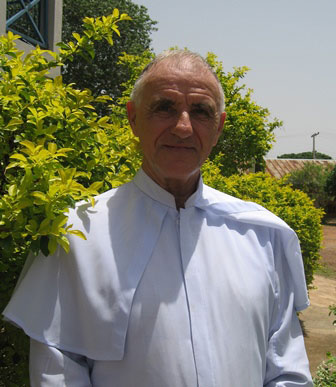
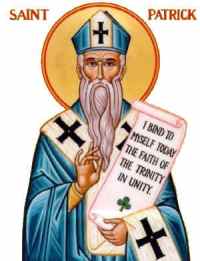
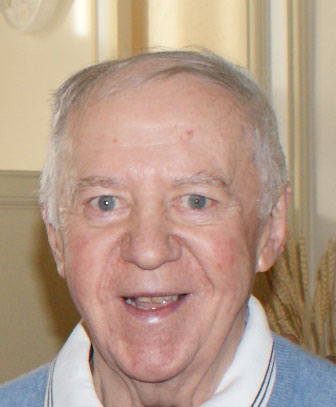
 Fr John Casey passed to his eternal reward at 8.45pm on Monday, 2 March 2015, at St Theresa’s Nursing Unit, African Missions, Blackrock Road, Cork. He was 84 years of age. Fr Seán Lynch SMA and his niece, Mary, were with him when he died.
Fr John Casey passed to his eternal reward at 8.45pm on Monday, 2 March 2015, at St Theresa’s Nursing Unit, African Missions, Blackrock Road, Cork. He was 84 years of age. Fr Seán Lynch SMA and his niece, Mary, were with him when he died.
 He was appointed to the diocese of Benin City, Nigeria which was led by Bishop Patrick J Kelly SMA. He served there from October 1958 – August 1962 during which he taught at Ishan Grammar School, Uromi and St Peter’s Claver’s College, Aghalokpe. He then went to teach at Notre Dame College, Ozoro until 1964. He then returned to Benin City diocese where he served until May 1969, during which he served on the teaching staff of the Immaculate Conception College [ICC], Benin City and Annunciation College, Irrua. For some of these years, Fr Jack was the Chaplain to the then Military Governor of the Mid-West, David Ejoor.
He was appointed to the diocese of Benin City, Nigeria which was led by Bishop Patrick J Kelly SMA. He served there from October 1958 – August 1962 during which he taught at Ishan Grammar School, Uromi and St Peter’s Claver’s College, Aghalokpe. He then went to teach at Notre Dame College, Ozoro until 1964. He then returned to Benin City diocese where he served until May 1969, during which he served on the teaching staff of the Immaculate Conception College [ICC], Benin City and Annunciation College, Irrua. For some of these years, Fr Jack was the Chaplain to the then Military Governor of the Mid-West, David Ejoor. He took a Sabbatical year [1978 – 1979], earning a Diploma in Religious Studies from St Patrick’s College, Maynooth. In 1986, Fr Jack transferred from the MidWest of Nigeria to western Nigeria, to the diocese of Ibadan, where he worked in three city parishes: Loyola, Christ the King and St Leo’s, Challenge.
He took a Sabbatical year [1978 – 1979], earning a Diploma in Religious Studies from St Patrick’s College, Maynooth. In 1986, Fr Jack transferred from the MidWest of Nigeria to western Nigeria, to the diocese of Ibadan, where he worked in three city parishes: Loyola, Christ the King and St Leo’s, Challenge.
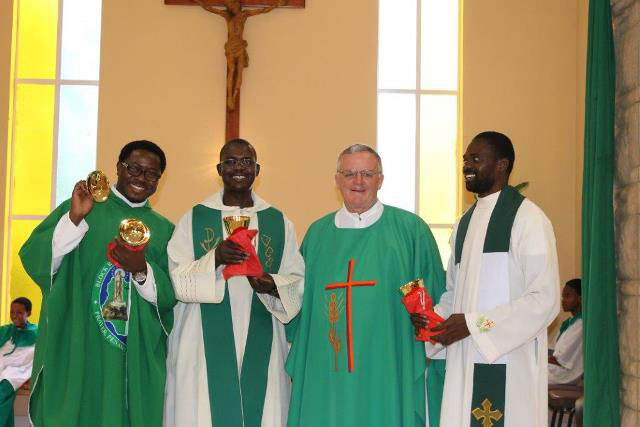
 To ackowledge their presence Fr. Michael presented each of the young priests with a chalice or ciborium that he had brought back from Ireland from the Apostolic Workers. They were intended for the parish of Montana but the occasion allowed the opportunity to demonstrate to the people the value of the work of these groups of dedicated lay people from Ireland who have supported the work of missionaries for years. They equip these young men with the essentials to undertake their work as priests in different parts of Africa. The church in South Africa must now follow their example and start raising funds to assist the various congregations who are now sending missionaries from various African countries to different countries in Africa. Montana has made a start as was evidenced by the support for the program. Well done to the members. We will provide a desk calendar for 2015 from the proceeds of the day and make it available in all the parishes where SMA priests work in South Africa. Also part of the proceeds will be forwarded to MSF to help in their work in Liberia, a country where SMA Fathers are working, in the fight against Ebola.
To ackowledge their presence Fr. Michael presented each of the young priests with a chalice or ciborium that he had brought back from Ireland from the Apostolic Workers. They were intended for the parish of Montana but the occasion allowed the opportunity to demonstrate to the people the value of the work of these groups of dedicated lay people from Ireland who have supported the work of missionaries for years. They equip these young men with the essentials to undertake their work as priests in different parts of Africa. The church in South Africa must now follow their example and start raising funds to assist the various congregations who are now sending missionaries from various African countries to different countries in Africa. Montana has made a start as was evidenced by the support for the program. Well done to the members. We will provide a desk calendar for 2015 from the proceeds of the day and make it available in all the parishes where SMA priests work in South Africa. Also part of the proceeds will be forwarded to MSF to help in their work in Liberia, a country where SMA Fathers are working, in the fight against Ebola.

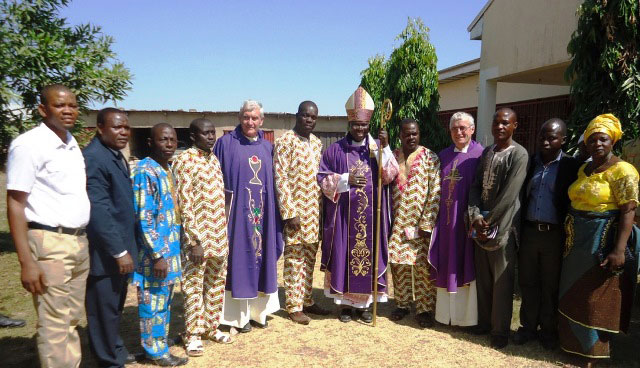

 On Sunday morning in the course of a 4-hour Mass he administered the Sacrament of Confirmation to 134 candidates. After Mass he blessed the foundation of a new Church to be built in the Mission Compound, which will cater for the needs of a swiftly expanding parish.
On Sunday morning in the course of a 4-hour Mass he administered the Sacrament of Confirmation to 134 candidates. After Mass he blessed the foundation of a new Church to be built in the Mission Compound, which will cater for the needs of a swiftly expanding parish. Though St Simon’s is already ten years old the time has come for a new church and, dring the pastoral visit, the Archbishop blessed the foundations for the new church.
Though St Simon’s is already ten years old the time has come for a new church and, dring the pastoral visit, the Archbishop blessed the foundations for the new church. of the church in the area that this Prefecture was again divided, and the then PA took charge of the new PA of Kaduna [1934]. He was succeeded by Fr John McCarthy who was to become the first bishop of Kaduna in 1953 and, later, its first Archbishop in 1959. As Archbishop of Kaduna he attended all four sessions of the Second Vatical Council [11 October 1962 – 8 December 1965].
of the church in the area that this Prefecture was again divided, and the then PA took charge of the new PA of Kaduna [1934]. He was succeeded by Fr John McCarthy who was to become the first bishop of Kaduna in 1953 and, later, its first Archbishop in 1959. As Archbishop of Kaduna he attended all four sessions of the Second Vatical Council [11 October 1962 – 8 December 1965].
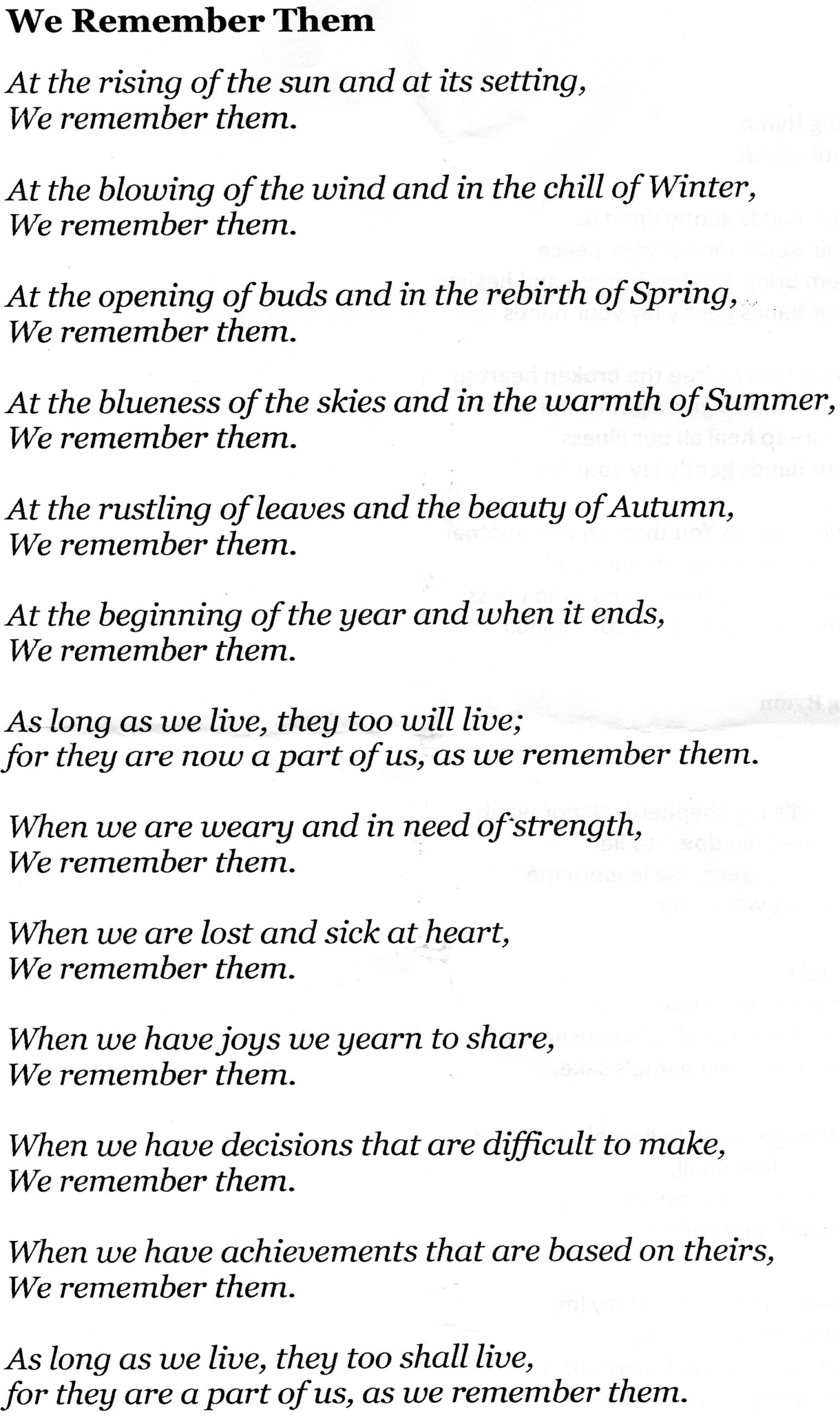
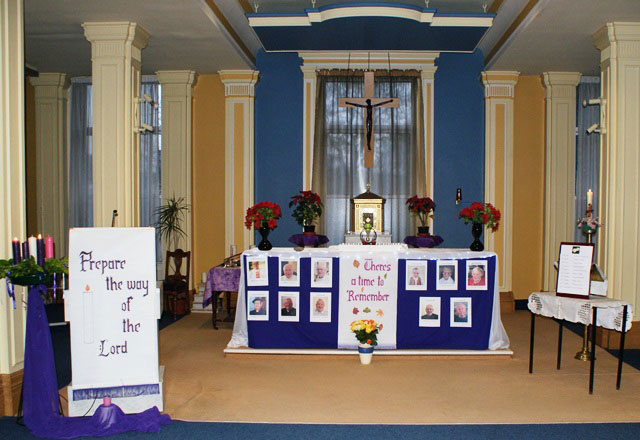

 Speaking of
Speaking of 

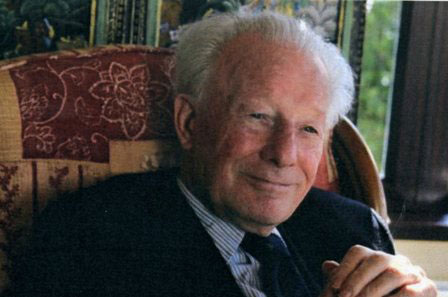
 Monsignor Tom Gavin [pictured during his rugby playing days] died on Christmas Day, 2009 at the age of 87. When he looked back on his two international appearances for Ireland, he gave credit, above all, to Jack Kyle, declaring: “He alone was worth the admission price”.
Monsignor Tom Gavin [pictured during his rugby playing days] died on Christmas Day, 2009 at the age of 87. When he looked back on his two international appearances for Ireland, he gave credit, above all, to Jack Kyle, declaring: “He alone was worth the admission price”.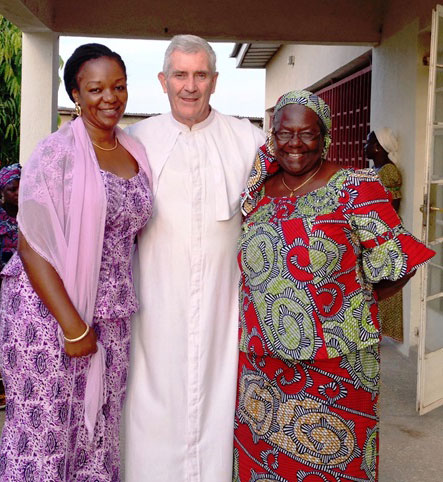
 After seven years in Ireland, he returned to Kaduna and moved into fulltime pastoral ministry. Assigned to a growing suburb of the city Fr Mark was the founding priest of St Peter’s SMA parish, Sabon Tasha. After seventeen years at St Peter’s, Fr Mark moved to develop a new part of the parish, handing over to Fr Dan O’Brien SMA. St Peter’s is now under the pastoral care of
After seven years in Ireland, he returned to Kaduna and moved into fulltime pastoral ministry. Assigned to a growing suburb of the city Fr Mark was the founding priest of St Peter’s SMA parish, Sabon Tasha. After seventeen years at St Peter’s, Fr Mark moved to develop a new part of the parish, handing over to Fr Dan O’Brien SMA. St Peter’s is now under the pastoral care of 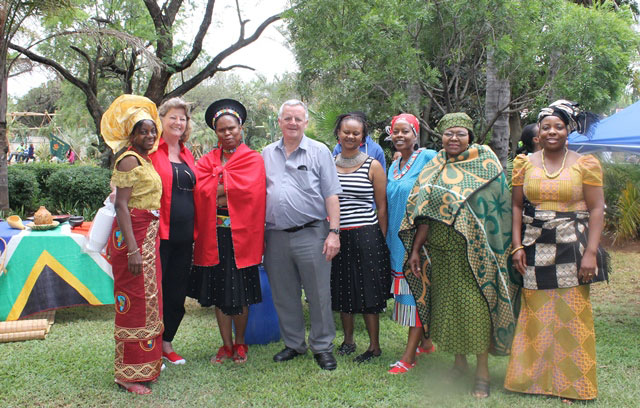


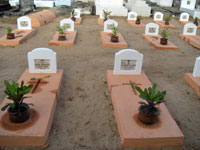
 When I worked in Nigeria I met a young Dominican priest there and he said to me that there were only two types of people, the living and the living dead, the latter being those gone before us marked with the sign of faith. So membership of the Church is not confined to this world.
When I worked in Nigeria I met a young Dominican priest there and he said to me that there were only two types of people, the living and the living dead, the latter being those gone before us marked with the sign of faith. So membership of the Church is not confined to this world.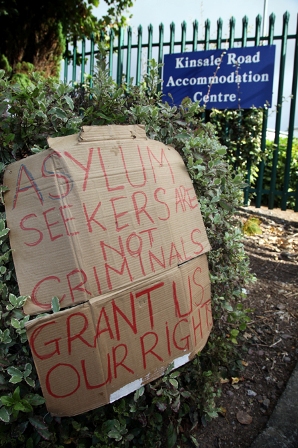
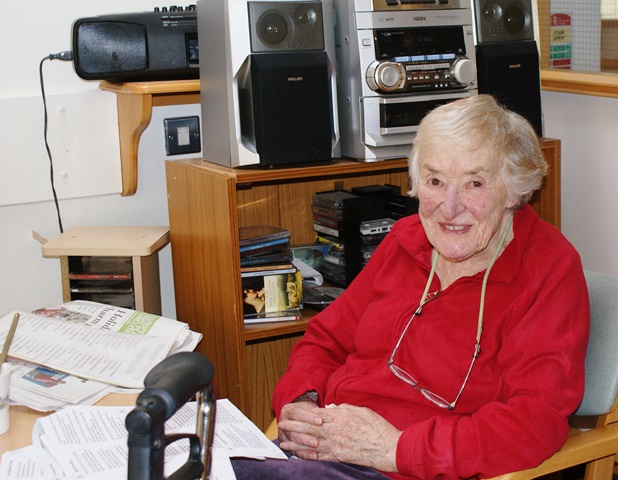

 her and, at Christmas time, she would gather money to support different missionary causes, including the purchase of animals for African families. With a brother in the SMA she was also very supportive of our missionaries in different African countries. As a result, in July 1992, she was admitted to Honorary membership in the Society of African Missions. This was a source of great joy to her as her brother, Fr John, was also admitted.
her and, at Christmas time, she would gather money to support different missionary causes, including the purchase of animals for African families. With a brother in the SMA she was also very supportive of our missionaries in different African countries. As a result, in July 1992, she was admitted to Honorary membership in the Society of African Missions. This was a source of great joy to her as her brother, Fr John, was also admitted.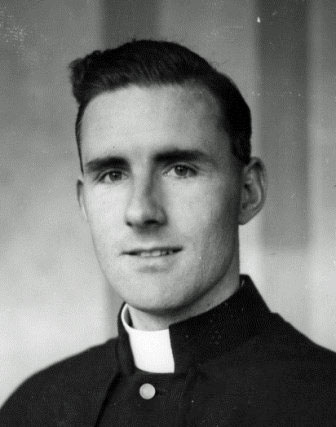
 Tom received his primary education at De La Salle, Stephen Street, Waterford and, in 1938, began his secondary schooling at De La Salle Newtown. In early 1939 he first heard of the SMA through a neighbour and it was this meeting that brought him to enter the SMA Juniorate – Sacred Heart College, Ballinafad, Co Mayo [1939-1941]. He completed his secondary schooling at the African Missions in Wilton, Cork [1941-1943].
Tom received his primary education at De La Salle, Stephen Street, Waterford and, in 1938, began his secondary schooling at De La Salle Newtown. In early 1939 he first heard of the SMA through a neighbour and it was this meeting that brought him to enter the SMA Juniorate – Sacred Heart College, Ballinafad, Co Mayo [1939-1941]. He completed his secondary schooling at the African Missions in Wilton, Cork [1941-1943].
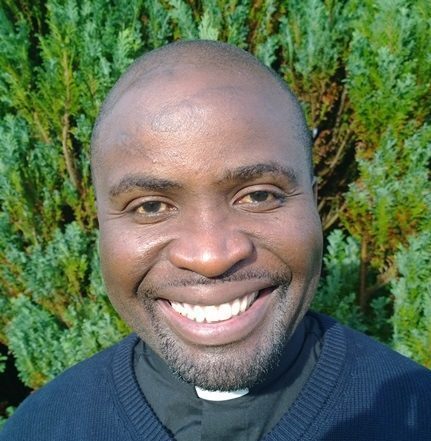
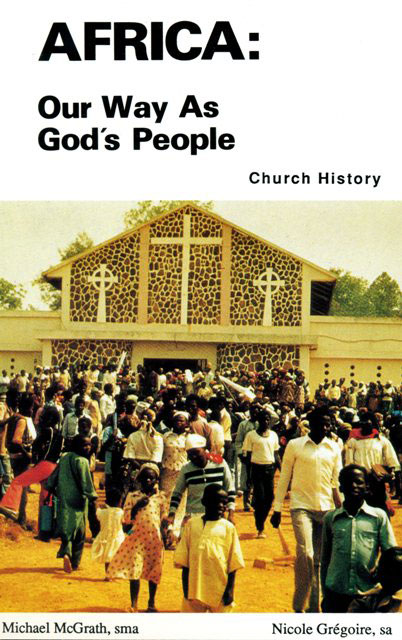
 For most of his 50 years as a missionary Fr Michael McGrath has worked in Kaduna, Nigeria. His primary interest has been in catechetics: teaching and training catechists and writing books suitable for teaching catechetics in Africa.
For most of his 50 years as a missionary Fr Michael McGrath has worked in Kaduna, Nigeria. His primary interest has been in catechetics: teaching and training catechists and writing books suitable for teaching catechetics in Africa. Michael’s involvement in catechetics has brought him to many parts of Africa and he has visited and worked in Ghana, Zambia, Tanzania, Uganda and Kenya.
Michael’s involvement in catechetics has brought him to many parts of Africa and he has visited and worked in Ghana, Zambia, Tanzania, Uganda and Kenya. The story of refugees throughout the world in the 21st century is not getting any better. The United Nations Refugee Agency announced recently that 3 million people from Syria alone are now refugees, forced through terror, to abandon their homes and secure livelihoods to find safety in another land. This century, only 14 years old, has so far seen over 50 million people flee their countries of origin and become refugees. More than during the Second World War! We are witnessing another exodus, this time almost global in scope. Recently Pope Francis likened the terrible violence, unrest and killings in so many countries to a third World War.
The story of refugees throughout the world in the 21st century is not getting any better. The United Nations Refugee Agency announced recently that 3 million people from Syria alone are now refugees, forced through terror, to abandon their homes and secure livelihoods to find safety in another land. This century, only 14 years old, has so far seen over 50 million people flee their countries of origin and become refugees. More than during the Second World War! We are witnessing another exodus, this time almost global in scope. Recently Pope Francis likened the terrible violence, unrest and killings in so many countries to a third World War.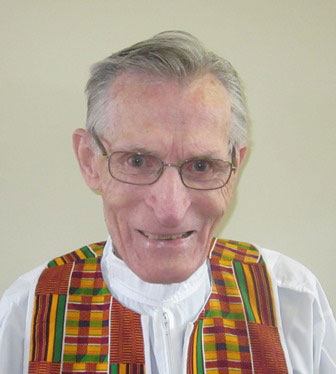
 Fr Thomas Sexton Doran SMA died peacefully on Tuesday afternoon, 9 September 2014 at the St Theresa’s Nursing Unit of the African Missions, Blackrock Road, Cork. Members of his family, SMA confreres and nursing staff were at his bedside when he died. He was 81 years of age.
Fr Thomas Sexton Doran SMA died peacefully on Tuesday afternoon, 9 September 2014 at the St Theresa’s Nursing Unit of the African Missions, Blackrock Road, Cork. Members of his family, SMA confreres and nursing staff were at his bedside when he died. He was 81 years of age.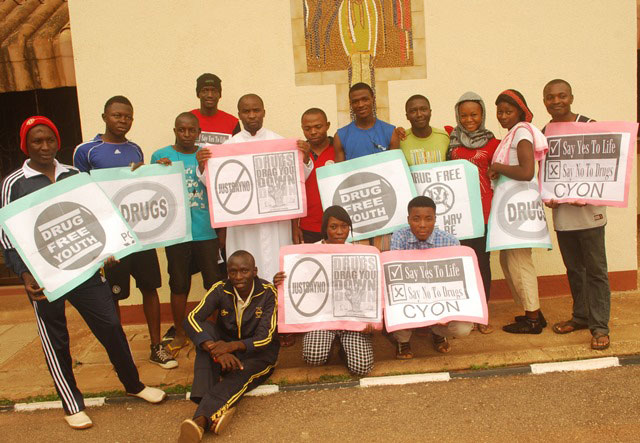
 Fr Ignatius was ordained on 26 June 2008 and his first missionary appointment was to northern Nigeria where he is still working. “Fr. John O’Keefe introduced me to the Nigerian culture and the history of evangelisation in Nigeria whose work was mostly done by Irish SMA priests.” According to our latest statistics, January 2014, the situation has changed. Of the 53 SMAs in Nigeria there are now 18 Irish and the others are from Benin Republic, England, Ghana, Ivory Coast, Kenya, Nigeria, Togo and Zambia.
Fr Ignatius was ordained on 26 June 2008 and his first missionary appointment was to northern Nigeria where he is still working. “Fr. John O’Keefe introduced me to the Nigerian culture and the history of evangelisation in Nigeria whose work was mostly done by Irish SMA priests.” According to our latest statistics, January 2014, the situation has changed. Of the 53 SMAs in Nigeria there are now 18 Irish and the others are from Benin Republic, England, Ghana, Ivory Coast, Kenya, Nigeria, Togo and Zambia.  “I have learnt a lot and had rich experiences from these missionaries. They have contributed immensely to my vocation and I follow their footsteps in trying to make the best out of my priesthood. And my priestly story cannot be complete without mentioning them
“I have learnt a lot and had rich experiences from these missionaries. They have contributed immensely to my vocation and I follow their footsteps in trying to make the best out of my priesthood. And my priestly story cannot be complete without mentioning them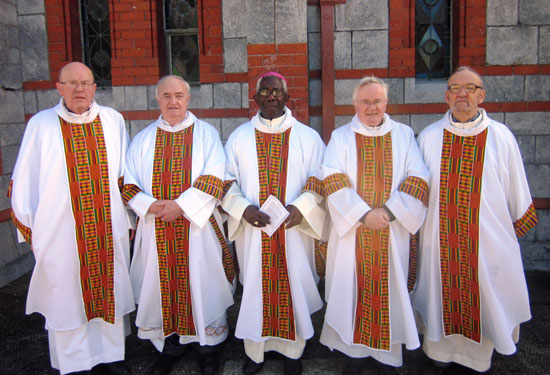

 Bill Foley was born in Ballybunion, Co Kerry, on 13 October 1935, the third of four sons born to William Foley and Bridget Stack. He received both his primary and secondary education at the CBS Tralee, where he and Fr John Quinlan SMA were classmates.
Bill Foley was born in Ballybunion, Co Kerry, on 13 October 1935, the third of four sons born to William Foley and Bridget Stack. He received both his primary and secondary education at the CBS Tralee, where he and Fr John Quinlan SMA were classmates.  Fr Bill was one of the leading figures of the SMA in the Post-Vatican II era. A big hearted generous extrovert with a keen practical intelligence and exceptional organisational skills, he was a natural leader. Little wonder, then, that very early on in his missionary life he was given key leadership roles in the Province – roles he would assume throughout his life. At the age of 32 he was appointed Superior of the Major seminary at Dromantine. In the heady atmosphere of the years following Vatican II this was not an easy time to be Superior of a Seminary and Fr Bill strove to steer a middle course between the students’ clamour for greater freedom and the need for order and responsibility.
Fr Bill was one of the leading figures of the SMA in the Post-Vatican II era. A big hearted generous extrovert with a keen practical intelligence and exceptional organisational skills, he was a natural leader. Little wonder, then, that very early on in his missionary life he was given key leadership roles in the Province – roles he would assume throughout his life. At the age of 32 he was appointed Superior of the Major seminary at Dromantine. In the heady atmosphere of the years following Vatican II this was not an easy time to be Superior of a Seminary and Fr Bill strove to steer a middle course between the students’ clamour for greater freedom and the need for order and responsibility. 
 Following his debilitating stroke in 2001 and retirement at SMA House, Wilton, Fr Bill bore his disability with great fortitude and resignation. And he remained active in many ways even if he could not move about as easily as before. He remained a valued member of the Board of Management of Tabor Lodge and maintained a huge correspondence with friends and SMA supporters, by post and phone. Big hearted and generous as always, he continued to support many of his SMA confreres in Africa, the projects of several congregations of sisters, as well as many other people who sought or needed his help.
Following his debilitating stroke in 2001 and retirement at SMA House, Wilton, Fr Bill bore his disability with great fortitude and resignation. And he remained active in many ways even if he could not move about as easily as before. He remained a valued member of the Board of Management of Tabor Lodge and maintained a huge correspondence with friends and SMA supporters, by post and phone. Big hearted and generous as always, he continued to support many of his SMA confreres in Africa, the projects of several congregations of sisters, as well as many other people who sought or needed his help.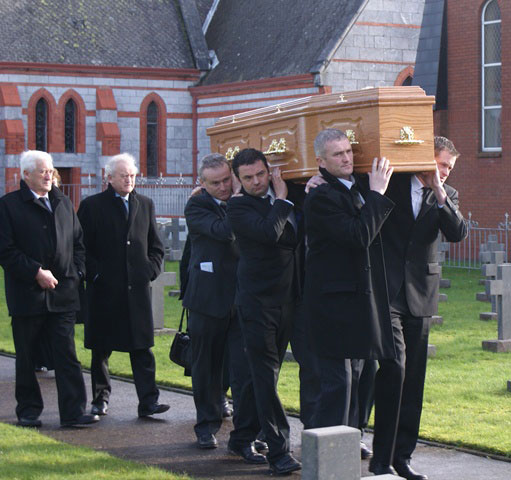
 The SMA Provincial Leader, Fr Michael McCabe, was the Principal Celebrant at the Funeral Mass for Fr Michael McEgan who died on Wednesday, 18 June 2014. The Principal Concelebrants were four of Fr Michael’s classmates: Bill Foley, Hugh Harkin, John Quinlan and Andy O’Sullivan.
The SMA Provincial Leader, Fr Michael McCabe, was the Principal Celebrant at the Funeral Mass for Fr Michael McEgan who died on Wednesday, 18 June 2014. The Principal Concelebrants were four of Fr Michael’s classmates: Bill Foley, Hugh Harkin, John Quinlan and Andy O’Sullivan. Michael was a missionary priest who enchanted many people by his gentle presence and the witness of a life totally dedicated to living and proclaiming the free gift of the Gospel. Let us recall briefly some of the key moments of his life.
Michael was a missionary priest who enchanted many people by his gentle presence and the witness of a life totally dedicated to living and proclaiming the free gift of the Gospel. Let us recall briefly some of the key moments of his life.  From Cloughballymore, Michael was sent for studies to Cork University College and, in 1957, was awarded a Bachelor of Arts degree in Latin and Philosophy. From Cork he moved on to the seminary of the African Missions in Dromantine, Newry, where he undertook his theological studies and further training for Priesthood. He became a permanent member of the Society on 14 June 1960 and was ordained a priest by Bishop Eugene O’Doherty in the Cathedral of Saints Patrick and Colman on 21 December 1960.
From Cloughballymore, Michael was sent for studies to Cork University College and, in 1957, was awarded a Bachelor of Arts degree in Latin and Philosophy. From Cork he moved on to the seminary of the African Missions in Dromantine, Newry, where he undertook his theological studies and further training for Priesthood. He became a permanent member of the Society on 14 June 1960 and was ordained a priest by Bishop Eugene O’Doherty in the Cathedral of Saints Patrick and Colman on 21 December 1960.
 In 1988, ill health forced Fr Michael to leave Nigeria and return to Ireland. After a period for recuperation, he was appointed to Ballyroe parish, Courtmacsherry, in the diocese of Cork and Ross. During the three years he ministered in that parish, Fr Michael endeared himself to the people, young and old, by the exemplary quality of his life and loving service of the people. Following his transfer from Ballyroe parish to Blackrock Road – again due to failing health – one of the parishioners paid the following tribute to Fr Michael in a letter to the then Provincial Superior: “His coming to Courtmacsherry was an answer to prayer, and the hand of God was in his appointment. His sincerity and prayerfulness touched us all… He constantly visited people in their homes, and knew everybody from the youngest child to the oldest in the house… He was very familiar, too, with our non-Catholic friends and visited them in their homes also – something which I know they very much appreciated… He constantly encouraged us to ‘Put God first in our lives’ – as he did himself”.
In 1988, ill health forced Fr Michael to leave Nigeria and return to Ireland. After a period for recuperation, he was appointed to Ballyroe parish, Courtmacsherry, in the diocese of Cork and Ross. During the three years he ministered in that parish, Fr Michael endeared himself to the people, young and old, by the exemplary quality of his life and loving service of the people. Following his transfer from Ballyroe parish to Blackrock Road – again due to failing health – one of the parishioners paid the following tribute to Fr Michael in a letter to the then Provincial Superior: “His coming to Courtmacsherry was an answer to prayer, and the hand of God was in his appointment. His sincerity and prayerfulness touched us all… He constantly visited people in their homes, and knew everybody from the youngest child to the oldest in the house… He was very familiar, too, with our non-Catholic friends and visited them in their homes also – something which I know they very much appreciated… He constantly encouraged us to ‘Put God first in our lives’ – as he did himself”.

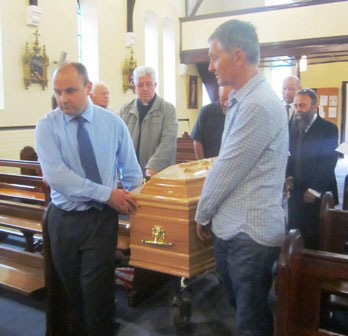
 At 6.30pm a large crowd gathered for the brief Prayer ceremony led by Fr Dan Cashman SMA before the removal to the adjacent St Joseph’s SMA Church at Wilton.
At 6.30pm a large crowd gathered for the brief Prayer ceremony led by Fr Dan Cashman SMA before the removal to the adjacent St Joseph’s SMA Church at Wilton. We are here to honour this man of fallible faults and priestly service who is now the recipient of these words, ‘come, good and faithful servant. Enter the joy of your Lord.’ We echo these words for we believe that our human journey in God-touched and that Christ’s priesthood is powerful and that a life given in service has every reason to expect resurrection. Bill’s epitaph could have been written by a Rev Sister when he left Nigeria. In her letter to him she wrote, ‘the poor will miss you.’ It is not only the poor who will miss Fr Bill Foley SMA.
We are here to honour this man of fallible faults and priestly service who is now the recipient of these words, ‘come, good and faithful servant. Enter the joy of your Lord.’ We echo these words for we believe that our human journey in God-touched and that Christ’s priesthood is powerful and that a life given in service has every reason to expect resurrection. Bill’s epitaph could have been written by a Rev Sister when he left Nigeria. In her letter to him she wrote, ‘the poor will miss you.’ It is not only the poor who will miss Fr Bill Foley SMA.
 The principal concelebrants were the SMA Superior General, Fr Fachtna O’Driscoll, Tralee schoolmate, Fr John Quinlan SMA, Fr Eamonn Finnegan SMA [who was encouraged to study for the priesthood by Fr Bill and is presently the Leader of the Claregalway community] and close friend Fr Finbarr Crowley [PP of Inishannon].
The principal concelebrants were the SMA Superior General, Fr Fachtna O’Driscoll, Tralee schoolmate, Fr John Quinlan SMA, Fr Eamonn Finnegan SMA [who was encouraged to study for the priesthood by Fr Bill and is presently the Leader of the Claregalway community] and close friend Fr Finbarr Crowley [PP of Inishannon].
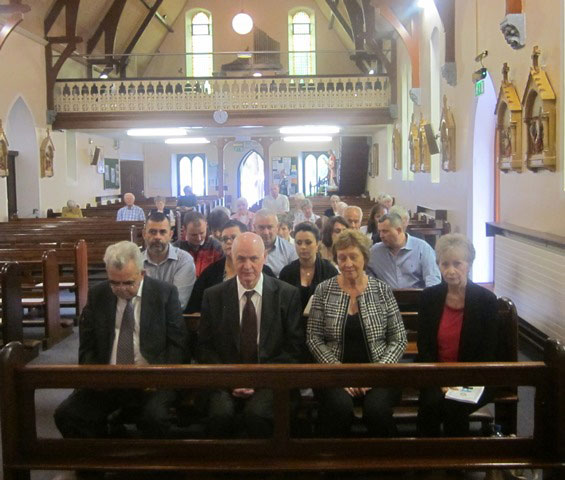
 The SMA Provincial Leader, Fr Michael McCabe, was Principal Celebrant, assisted by Fr Donal Fennessy [representing the British Province], Fr John Brown [Parish Priest of Our Lady & St Patrick’s, Walthamstow] and Fr Tom Harlow [SMA Parish, Wilton]. Forty-two other priests concelebrated the Mass.
The SMA Provincial Leader, Fr Michael McCabe, was Principal Celebrant, assisted by Fr Donal Fennessy [representing the British Province], Fr John Brown [Parish Priest of Our Lady & St Patrick’s, Walthamstow] and Fr Tom Harlow [SMA Parish, Wilton]. Forty-two other priests concelebrated the Mass. Martin Walsh was born in Liverpool on 7 September 1927 to Delia Ward and Patrick Walsh. He was the eldest boy in a family of six, three boys and three girls. His father hailed from Mayo and his mother from Galway and in early childhood some of the family returned to Galway where Martin completed his primary education.
Martin Walsh was born in Liverpool on 7 September 1927 to Delia Ward and Patrick Walsh. He was the eldest boy in a family of six, three boys and three girls. His father hailed from Mayo and his mother from Galway and in early childhood some of the family returned to Galway where Martin completed his primary education. and eager student. Following his ordination, he was sent to Cambridge for Further Studies and graduated in 1954. His first missionary appointment was to Ondo Diocese and he worked there for four years, mainly in the education apostolate. At the time there was a temporary school in a building adjacent to St Matthew’s Catholic Church in Ondo Town. By 1956 Fr Martin acquired a piece of land and the following year began building what became St Joseph’s College, which eventually was handed over to the De La Salle Brothers who still run it today. An SMA priest who worked with Fr Martin at the time recalls how, each afternoon, Fr Martin was accustomed to join the students in preparing the land for the building project by cutting down the bush. Fr Martin did not hesitate to take his part in this physically demanding task, with cutlass in hand and a big wide hat to protect his head from the burning sun!
and eager student. Following his ordination, he was sent to Cambridge for Further Studies and graduated in 1954. His first missionary appointment was to Ondo Diocese and he worked there for four years, mainly in the education apostolate. At the time there was a temporary school in a building adjacent to St Matthew’s Catholic Church in Ondo Town. By 1956 Fr Martin acquired a piece of land and the following year began building what became St Joseph’s College, which eventually was handed over to the De La Salle Brothers who still run it today. An SMA priest who worked with Fr Martin at the time recalls how, each afternoon, Fr Martin was accustomed to join the students in preparing the land for the building project by cutting down the bush. Fr Martin did not hesitate to take his part in this physically demanding task, with cutlass in hand and a big wide hat to protect his head from the burning sun! Following a one year sabbatical at Boston College where he completed a Masters’ Degree in Divinity, Fr Martin was appointed in 1982 to teach Philosophy at St Paul’s College Seminary, in Gbarnga, Liberia. This was an international seminary for training priests from the dioceses of Liberia, Sierra Leone and the Gambia. I happened to be the Dean of Studies during the time Martin was teaching there and I have fond memories of him as a wise, soft-spoken, elder brother, whose advice I appreciated, even if I didn’t always follow it. He would often knock on the door of my room and ask if he could have a word with me. I would say ‘Sure, Martin’. He would then offer me his advice and say ‘I don’t want you to act on it now but put it on the back burner’. And, indeed, more often than not I kept his advice on the back burner. Martin was loved by the students not only because he was a superb teacher but because of the personal interest he took in those he taught, most of them now priests and a few bishops. During his time in Liberia, Martin completed work on his major academic project, a 500 page History of Philosophy which would serve as a vade mecum of seminarians. Martin’s text book was published in 1985 and is still widely uses in seminaries throughout Africa.
Following a one year sabbatical at Boston College where he completed a Masters’ Degree in Divinity, Fr Martin was appointed in 1982 to teach Philosophy at St Paul’s College Seminary, in Gbarnga, Liberia. This was an international seminary for training priests from the dioceses of Liberia, Sierra Leone and the Gambia. I happened to be the Dean of Studies during the time Martin was teaching there and I have fond memories of him as a wise, soft-spoken, elder brother, whose advice I appreciated, even if I didn’t always follow it. He would often knock on the door of my room and ask if he could have a word with me. I would say ‘Sure, Martin’. He would then offer me his advice and say ‘I don’t want you to act on it now but put it on the back burner’. And, indeed, more often than not I kept his advice on the back burner. Martin was loved by the students not only because he was a superb teacher but because of the personal interest he took in those he taught, most of them now priests and a few bishops. During his time in Liberia, Martin completed work on his major academic project, a 500 page History of Philosophy which would serve as a vade mecum of seminarians. Martin’s text book was published in 1985 and is still widely uses in seminaries throughout Africa.
 Fr Angelo Lafferty SMA was the Cantor and Fr Tommie Wade SMA was MC. The Church Sacristan, Miss Margaret O’Regan, had earlier prepared the Altar and chapel for the celebration of the Eucharist.
Fr Angelo Lafferty SMA was the Cantor and Fr Tommie Wade SMA was MC. The Church Sacristan, Miss Margaret O’Regan, had earlier prepared the Altar and chapel for the celebration of the Eucharist. Barry’s sharing showed a side of Fr Martin that was unknown to his SMA confreres. Fr Martin was not one to ever draw attention to himself.
Barry’s sharing showed a side of Fr Martin that was unknown to his SMA confreres. Fr Martin was not one to ever draw attention to himself.
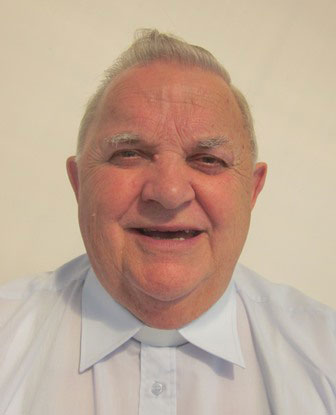
 Bill Foley was born in Ballybunion, Co Kerry on 13 October 1935, the third of four sons born to Bridget [née Stack] and William Foley. He was baptised in St John’s Church, Ballybunion parish three days later. He was confirmed in the same Church on 28 September 1947.
Bill Foley was born in Ballybunion, Co Kerry on 13 October 1935, the third of four sons born to Bridget [née Stack] and William Foley. He was baptised in St John’s Church, Ballybunion parish three days later. He was confirmed in the same Church on 28 September 1947.

 After one year as Rector of the SMA House, Maynooth, Fr Bill was elected to the Provincial Council where he was responsible for, inter alia, Promotion and Property. He was re-elected in 1978 and served as Vice Provincial Superior to Fr Con Murphy. In accordance with the SMA Constitutions it was not possible for Bill to serve a third term as Councillor and so, in 1983, he returned to Dromantine as Superior where he devoted his energies to promoting the Mission Association Cards as a new means of funding for the Missions. Our photo shows Fr Bill and Fr Brendan Dunning SMA who has been part of the SMA Promotion team for many years.
After one year as Rector of the SMA House, Maynooth, Fr Bill was elected to the Provincial Council where he was responsible for, inter alia, Promotion and Property. He was re-elected in 1978 and served as Vice Provincial Superior to Fr Con Murphy. In accordance with the SMA Constitutions it was not possible for Bill to serve a third term as Councillor and so, in 1983, he returned to Dromantine as Superior where he devoted his energies to promoting the Mission Association Cards as a new means of funding for the Missions. Our photo shows Fr Bill and Fr Brendan Dunning SMA who has been part of the SMA Promotion team for many years.
 Bill Foley was also well known and appreciated in the wider Society, attending several General and Provincial Assemblies, serving on numerous Commissions where a clear head, which could look at all sides of an argument, and come to a clear rational decision was needed. Two former Superiors General, Fathers Joe Hardy and Daniel Cardot, spoke of his kindness and attention to detail during the different Commisisons and Assemblies they participated in. Fr Hardy wrote: “The last time I met him in 2009 he was still full of humour and happy to remind me of our collaboration during the post Vatican II SMA General Assemblies and the writing of our new Constitutions… Bill was a true SMA man, a devoted missionary to Africa, a clever administrator, fair to the job and to his friends. God knows his faithful servants and welcomes Bill to His table. He will now be singing for ever in the joy of his Lord.” He is pictured (on right) with Frs Jackie Power, Joe Hardy, Kevin Scanlan and Lambert Meurders.
Bill Foley was also well known and appreciated in the wider Society, attending several General and Provincial Assemblies, serving on numerous Commissions where a clear head, which could look at all sides of an argument, and come to a clear rational decision was needed. Two former Superiors General, Fathers Joe Hardy and Daniel Cardot, spoke of his kindness and attention to detail during the different Commisisons and Assemblies they participated in. Fr Hardy wrote: “The last time I met him in 2009 he was still full of humour and happy to remind me of our collaboration during the post Vatican II SMA General Assemblies and the writing of our new Constitutions… Bill was a true SMA man, a devoted missionary to Africa, a clever administrator, fair to the job and to his friends. God knows his faithful servants and welcomes Bill to His table. He will now be singing for ever in the joy of his Lord.” He is pictured (on right) with Frs Jackie Power, Joe Hardy, Kevin Scanlan and Lambert Meurders. But ‘retirement’ did not mean sitting down and doing nothing! Fr Bill remained active in many ways even if he could not move about as easily as before. He maintained a huge correspondance with friends and SMA supporters, by post and phone. His inability to drive was a huge blow for him but many kind family and friends brought him to places he wanted to go.
But ‘retirement’ did not mean sitting down and doing nothing! Fr Bill remained active in many ways even if he could not move about as easily as before. He maintained a huge correspondance with friends and SMA supporters, by post and phone. His inability to drive was a huge blow for him but many kind family and friends brought him to places he wanted to go.
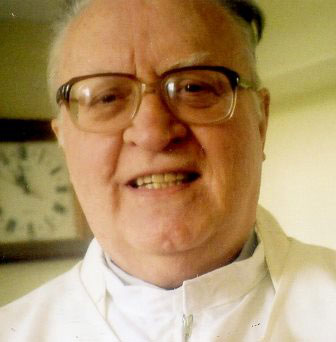
 Fr Martin J Walsh died peacefully at 7.30am on Tuesday, 29 July 2014 in the St Theresa’s Nursing Unit at the African Missions, Blackrock Road, Cork. He was 86 years of age.
Fr Martin J Walsh died peacefully at 7.30am on Tuesday, 29 July 2014 in the St Theresa’s Nursing Unit at the African Missions, Blackrock Road, Cork. He was 86 years of age.
 He undertook his theological studies at the African Missions Major seminary in Dromantine, Newry, becoming a permanent member of the Society on 12 June 1950.
He undertook his theological studies at the African Missions Major seminary in Dromantine, Newry, becoming a permanent member of the Society on 12 June 1950. The Society was invited by the Archbishop of Perth to staff a new College and run a parish in Beaconsfield. After initial reservations etc it was agreed to take on this new venture. Fr Martin, along with Fr John Creaven [Irish Provincial Superior] and Fr Con Murphy went to Perth in 1963 to examine the project. To get a flavour of the education system in the country, Fr Martin taught for some months at the Christian Brothers Trinity College in Perth. Fr Murphy was recalled for an African appointment and Fr Martin was appointed as Dean of Students at St Brendan’s College and taught there until 1969.
The Society was invited by the Archbishop of Perth to staff a new College and run a parish in Beaconsfield. After initial reservations etc it was agreed to take on this new venture. Fr Martin, along with Fr John Creaven [Irish Provincial Superior] and Fr Con Murphy went to Perth in 1963 to examine the project. To get a flavour of the education system in the country, Fr Martin taught for some months at the Christian Brothers Trinity College in Perth. Fr Murphy was recalled for an African appointment and Fr Martin was appointed as Dean of Students at St Brendan’s College and taught there until 1969. When St Paul’s College Major seminary in Gbarnga, Liberia had need for a Philosophy teacher Fr Martin was sent. Gbarnga was then in the Archdiocese of Monrovia. It is now a diocese in its own right. During his three years in Liberia he wrote A History of Philosophy – a book which summarised the eleven-volume work of Frederick Coppleston. This book became the standard text book in many seminaries, lauded for its simplicity yet completeness. A five-year appointment as Editor of the Irish Provincial Bulletin – a theological and pastoral review of sorts – was his next appointment and he lived in Blackrock Road during this period.
When St Paul’s College Major seminary in Gbarnga, Liberia had need for a Philosophy teacher Fr Martin was sent. Gbarnga was then in the Archdiocese of Monrovia. It is now a diocese in its own right. During his three years in Liberia he wrote A History of Philosophy – a book which summarised the eleven-volume work of Frederick Coppleston. This book became the standard text book in many seminaries, lauded for its simplicity yet completeness. A five-year appointment as Editor of the Irish Provincial Bulletin – a theological and pastoral review of sorts – was his next appointment and he lived in Blackrock Road during this period.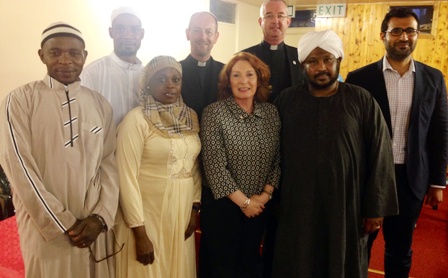
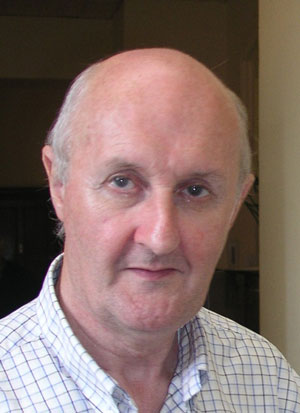
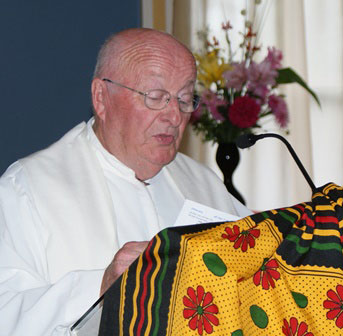
 Bishop Tim Carroll SMA, emeritus Vicar Apostolic of Kontagora,
Bishop Tim Carroll SMA, emeritus Vicar Apostolic of Kontagora, Nigeria, preached at the Thanksgiving Mass for the 1964 Ordination Class.
Nigeria, preached at the Thanksgiving Mass for the 1964 Ordination Class. 
 Another member of this class produced books on catechetics, translated into several languages. Another has produced a number of books on the Catholic Faith, a seminary text book on priesthood, and is working on another.
Another member of this class produced books on catechetics, translated into several languages. Another has produced a number of books on the Catholic Faith, a seminary text book on priesthood, and is working on another. These people are the unseen roots, that sent nourishment upwards, feeding and supporting the frail and delicate tree of SMA Mission, that later blossomed and was heavy with fruit.
These people are the unseen roots, that sent nourishment upwards, feeding and supporting the frail and delicate tree of SMA Mission, that later blossomed and was heavy with fruit. Fr Con Murphy (left) and Bishop Patrick J Harrington (right) have served in 7 different countries, as well as in leadership positions in the Society. Fr Murphy served in Nigeria, South and Kenya as well as serving as Irish Provincial Superior for two terms; Bishop Harrington served in Australia, Liberia and Kenya and two terms as SMA Superior General based in Rome. For nearly 12 years he served as Bishop of Lodwar, Kenya.
Fr Con Murphy (left) and Bishop Patrick J Harrington (right) have served in 7 different countries, as well as in leadership positions in the Society. Fr Murphy served in Nigeria, South and Kenya as well as serving as Irish Provincial Superior for two terms; Bishop Harrington served in Australia, Liberia and Kenya and two terms as SMA Superior General based in Rome. For nearly 12 years he served as Bishop of Lodwar, Kenya.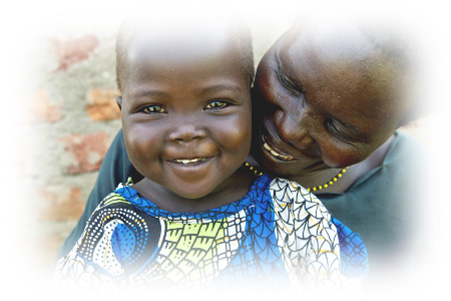
 There are more than 100 million ‘street children’. Our SMA Peace & Justice calendar for July / August 2014 highlights some aspects of life as a ‘Street child’.
There are more than 100 million ‘street children’. Our SMA Peace & Justice calendar for July / August 2014 highlights some aspects of life as a ‘Street child’.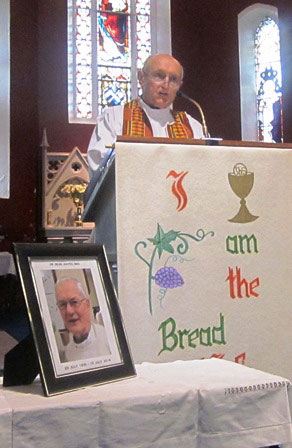
 Fr Seán Hayes requested that one of his classmates, Fr John Horgan, should preach at his funeral Mass. Drawing on Isaiah 25:6-9, Romans 5:5-11 and John 17:24-26, Fr Horgan (pictured) preached the following homily.
Fr Seán Hayes requested that one of his classmates, Fr John Horgan, should preach at his funeral Mass. Drawing on Isaiah 25:6-9, Romans 5:5-11 and John 17:24-26, Fr Horgan (pictured) preached the following homily. When such experiences are internalised they give the missionary a true picture of what it means to be on mission, to do mission and to be a missionary.
When such experiences are internalised they give the missionary a true picture of what it means to be on mission, to do mission and to be a missionary.
 Because of the civil war in Liberia, the main work of missionaries at the time was the distribution of AID to a needy population. Sean felt uncomfortable in this role. So after some years he returned to Ireland and accepted the position of Director of the Family Vocations Crusade (FVC) in Leinster and afterwards in Dublin.
Because of the civil war in Liberia, the main work of missionaries at the time was the distribution of AID to a needy population. Sean felt uncomfortable in this role. So after some years he returned to Ireland and accepted the position of Director of the Family Vocations Crusade (FVC) in Leinster and afterwards in Dublin.  For medical reasons, Sean officially retired to the SMA House in Blackrock Road here in Cork after 54 active years in the service of the SMA – 33 years in Africa and 21 years as FVC Director.
For medical reasons, Sean officially retired to the SMA House in Blackrock Road here in Cork after 54 active years in the service of the SMA – 33 years in Africa and 21 years as FVC Director.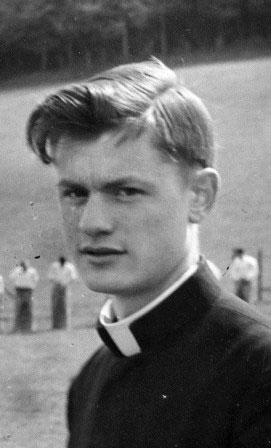
 The SMA is mourning the death of Fr Seán Hayes which occurred at Marymount Hospice, Cork on Tuesday evening, 15 July 2014, aged 78 years.
The SMA is mourning the death of Fr Seán Hayes which occurred at Marymount Hospice, Cork on Tuesday evening, 15 July 2014, aged 78 years. Fr. Seán left Nigeria in 1987 and, after holidays, headed for the Irish Province’s oldest mission country: Liberia. It was a time of civil war in that country but, having already endured the terrible violence of the Nigerian Civil War [1966-1970] the situation held no fear for Fr Seán.
Fr. Seán left Nigeria in 1987 and, after holidays, headed for the Irish Province’s oldest mission country: Liberia. It was a time of civil war in that country but, having already endured the terrible violence of the Nigerian Civil War [1966-1970] the situation held no fear for Fr Seán.  Eight years ago Fr Seán was diagnosed with cancer but he continued to do his work as well as undergoing regular treatment for his illness. In 2012 the decision was made that he would step aside from his work in Dublin and ‘retire’ to the African Missions House on Blackrock Road, Cork. It was the end of 54 active years in the service of the Society – 33 years in Africa [Nigeria and Liberia] and 21 years as FVC Director in the Leinster and Dublin areas. In his message to our supporters at that time he wrote: “You all have been wonderful, loyal and generous with me and the work. I will continue to remember you in my Masses. May God bless you and keep you well.” No doubt Seán will continue to pray for them from his place with God.
Eight years ago Fr Seán was diagnosed with cancer but he continued to do his work as well as undergoing regular treatment for his illness. In 2012 the decision was made that he would step aside from his work in Dublin and ‘retire’ to the African Missions House on Blackrock Road, Cork. It was the end of 54 active years in the service of the Society – 33 years in Africa [Nigeria and Liberia] and 21 years as FVC Director in the Leinster and Dublin areas. In his message to our supporters at that time he wrote: “You all have been wonderful, loyal and generous with me and the work. I will continue to remember you in my Masses. May God bless you and keep you well.” No doubt Seán will continue to pray for them from his place with God.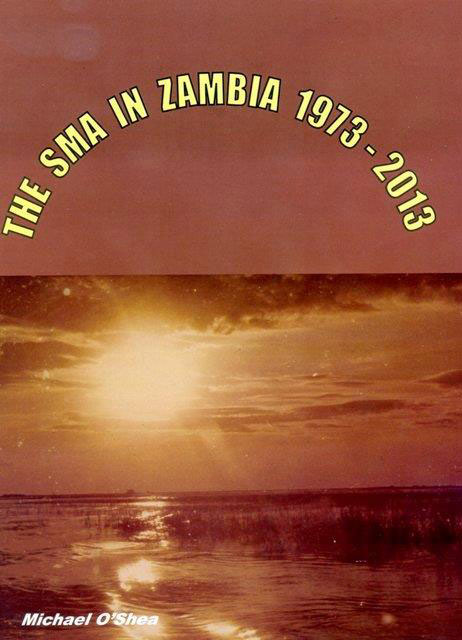
 Fr Michael O’Shea, one of the early pioneers of the SMA presence in Zambia, has added to his literary output with a history of the SMA presence in Zambia. We present here a review of the book written by a seminarian from Mpima Major seminary where Fr Michael has taught for many years.
Fr Michael O’Shea, one of the early pioneers of the SMA presence in Zambia, has added to his literary output with a history of the SMA presence in Zambia. We present here a review of the book written by a seminarian from Mpima Major seminary where Fr Michael has taught for many years.

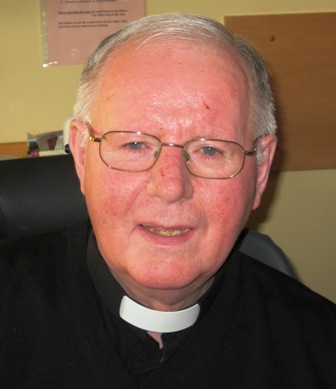
 The Society of African Missions in Ireland is mourning the death of Fr Michael McEgan, at the age of 80 years. Fr Michael died peacefully on Wednesday, 18 June 2014, in St Theresa’s Nursing Centre at the African Missions, Blackrock Road, Cork with the Community Leader, Fr Colum O’Shea and Fr Frank Meehan, his sister Bea. Also present was Fr Michael’s devoted carer, Margaret O’Regan and two members of the Nursing staff, Siobhan Humphreys and Alice Good.
The Society of African Missions in Ireland is mourning the death of Fr Michael McEgan, at the age of 80 years. Fr Michael died peacefully on Wednesday, 18 June 2014, in St Theresa’s Nursing Centre at the African Missions, Blackrock Road, Cork with the Community Leader, Fr Colum O’Shea and Fr Frank Meehan, his sister Bea. Also present was Fr Michael’s devoted carer, Margaret O’Regan and two members of the Nursing staff, Siobhan Humphreys and Alice Good.
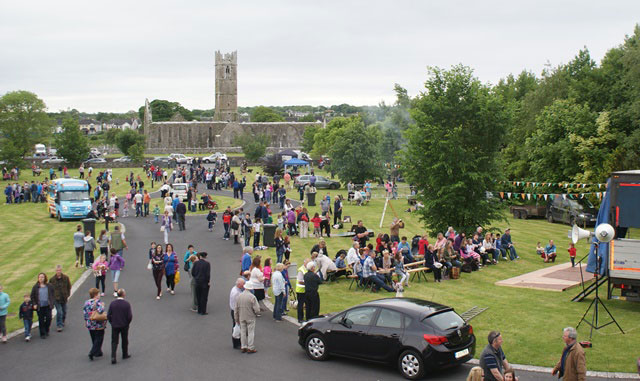



 Agnes Lenihan was one of many who spent hours preparing food, sandwiches, buns etc etc to provide for the hungry.
Agnes Lenihan was one of many who spent hours preparing food, sandwiches, buns etc etc to provide for the hungry. And unlike the Parable of the Five Thousand there were no “seven baskets full” left over afterwards. A tribute to all the team.
And unlike the Parable of the Five Thousand there were no “seven baskets full” left over afterwards. A tribute to all the team.





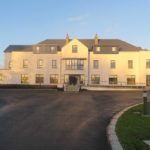 SMA Zimmermann House, Cloonbigeen, Claregalway, Co Galway, H91 YK64
SMA Zimmermann House, Cloonbigeen, Claregalway, Co Galway, H91 YK64

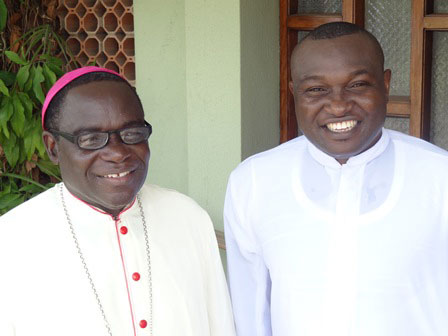




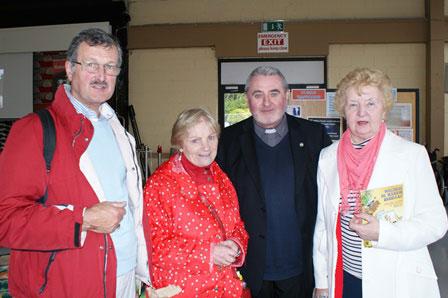


 Director, Leinster), her husband Paul, Fr P J Kelly (from Lawrencetown, Co Galway is home on holidays from Tanzania) and Fr Michael McKee (from Dungannon, Co Tyrone, also home from Tanzania).
Director, Leinster), her husband Paul, Fr P J Kelly (from Lawrencetown, Co Galway is home on holidays from Tanzania) and Fr Michael McKee (from Dungannon, Co Tyrone, also home from Tanzania).



 “The instability caused by the violence has worked in Chadian interests, the armed groups’ interests, and in the interests of all those who covet our mineral resources“, according to the bishop, with Muslims and Christians being “used like puppets to perpetuate the chaos which prevents our prized commodities from leaving for Asian markets.
“The instability caused by the violence has worked in Chadian interests, the armed groups’ interests, and in the interests of all those who covet our mineral resources“, according to the bishop, with Muslims and Christians being “used like puppets to perpetuate the chaos which prevents our prized commodities from leaving for Asian markets. Asked if, with this latest statement, he feared again for his life after his recent kidnapping and the killing of one of his priests by Seleka rebels, the bishop said the world would see the full extent of “outside corrupting influences” in CAR should he be targeted again.
Asked if, with this latest statement, he feared again for his life after his recent kidnapping and the killing of one of his priests by Seleka rebels, the bishop said the world would see the full extent of “outside corrupting influences” in CAR should he be targeted again.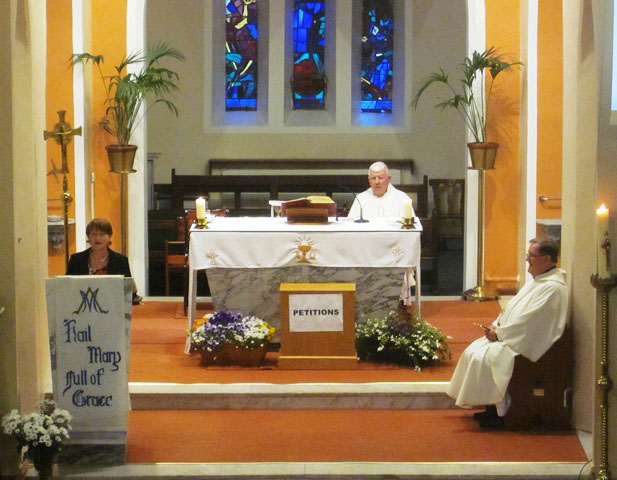
 Ms Juli Rea shared on the fourth night of the SMA National Novena in honour of Our Lady in St Joseph’s SMA Church, Blackrock Road, Cork. Ms Rea shared on the theme: Mary, Queen of Peace.
Ms Juli Rea shared on the fourth night of the SMA National Novena in honour of Our Lady in St Joseph’s SMA Church, Blackrock Road, Cork. Ms Rea shared on the theme: Mary, Queen of Peace. Mary’s journey brought her to the foot of the cross and to a set of circumstances the pain of which I cannot begin to imagine. And yet she stayed there and watched and waited. And in that watching and waiting she gives testament over and over again to that virtue of peace; of finding a reserve of ‘peace within’ that allows you to cope with the world as you find it.
Mary’s journey brought her to the foot of the cross and to a set of circumstances the pain of which I cannot begin to imagine. And yet she stayed there and watched and waited. And in that watching and waiting she gives testament over and over again to that virtue of peace; of finding a reserve of ‘peace within’ that allows you to cope with the world as you find it.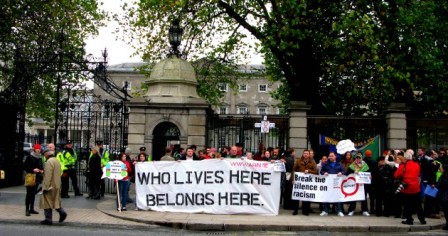
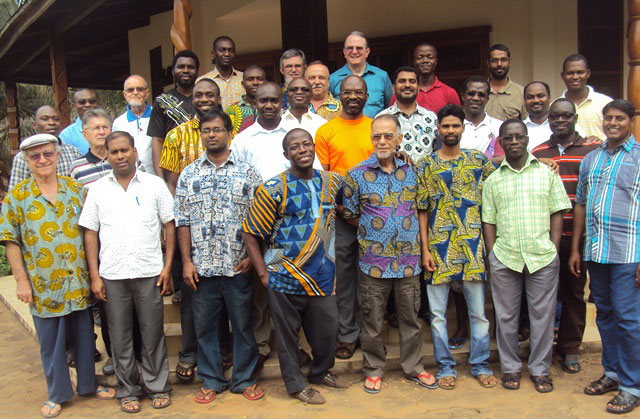

 The Assembly was officially opened by Fr Bruno Miyigbena, the SMA Regional Superior. Fr Bruno, a member of the Bight of Benin District-in-formation (BBDF) is the first Beninois SMA priest to lead the Region, having succeeded Fr Michel L’Hostis (Lyons Province) in 2013.
The Assembly was officially opened by Fr Bruno Miyigbena, the SMA Regional Superior. Fr Bruno, a member of the Bight of Benin District-in-formation (BBDF) is the first Beninois SMA priest to lead the Region, having succeeded Fr Michel L’Hostis (Lyons Province) in 2013. 
 I once visited a family with 4 children. The parents explained to me that their youngest, a boy of 14 years, had special needs with regard to his educational ability. With patience he could understand most things unlike the others who learned more quickly. The parents particularly loved this child and seemed to give him more of their love and attention because of his particular needs.
I once visited a family with 4 children. The parents explained to me that their youngest, a boy of 14 years, had special needs with regard to his educational ability. With patience he could understand most things unlike the others who learned more quickly. The parents particularly loved this child and seemed to give him more of their love and attention because of his particular needs.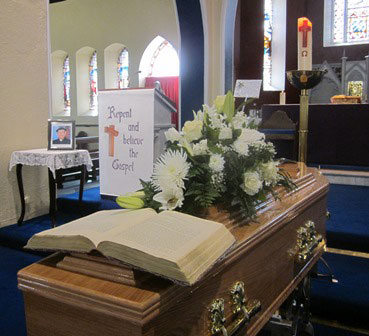
 Fr Liam O’Callaghan died on 5 April 2014 at the African Missions, Blackrock Road, Cork in his 96th year and the 73rd of his priesthood. He was the oldest member of the Province.
Fr Liam O’Callaghan died on 5 April 2014 at the African Missions, Blackrock Road, Cork in his 96th year and the 73rd of his priesthood. He was the oldest member of the Province. We thank God for Fr Liam’s generous offering of himself in the service of the Lord and of others all through his life. We also ask the Lord to console the members of his family and all those who were close to him and will miss him.
We thank God for Fr Liam’s generous offering of himself in the service of the Lord and of others all through his life. We also ask the Lord to console the members of his family and all those who were close to him and will miss him. The Readings for the Mass – from the Book of Wisdom, St Paul to the Romans – were read by Fr Liam’s nieces, Mary O’Leary and Ger O’Callaghan. Fr McCabe read from the Gospel of St Matthew. His nieces also brought the bread and wine for the Mass to the Altar at the Offertory time.
The Readings for the Mass – from the Book of Wisdom, St Paul to the Romans – were read by Fr Liam’s nieces, Mary O’Leary and Ger O’Callaghan. Fr McCabe read from the Gospel of St Matthew. His nieces also brought the bread and wine for the Mass to the Altar at the Offertory time.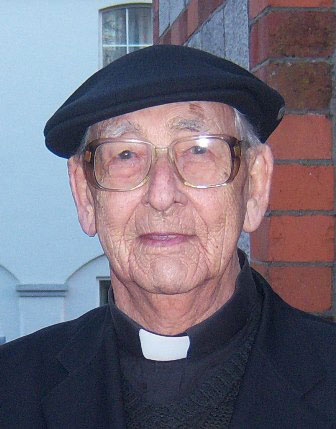
 The Society of African Missions in Ireland is mourning the death of its most senior member and priest, Fr Liam O’Callaghan, at the age of 95 years of age. Fr Liam died peacefully on Saturday, 5 April 2014, in St Theresa’s Nursing Centre at the African Missions, Blackrock Road, Cork with Fr Colum O’Shea, Fr Eddie O’Connor and some of the Nusing staff gathered around him.
The Society of African Missions in Ireland is mourning the death of its most senior member and priest, Fr Liam O’Callaghan, at the age of 95 years of age. Fr Liam died peacefully on Saturday, 5 April 2014, in St Theresa’s Nursing Centre at the African Missions, Blackrock Road, Cork with Fr Colum O’Shea, Fr Eddie O’Connor and some of the Nusing staff gathered around him. He was baptised in Innishannon Parish and confirmed in St Finbarr’s West, Cork City. His brother Denis, an SMA seminarian, was drowned in an accident trying to save a fellow seminarian in 1929. He is buried in the same cemetery as Fr Liam will be next Monday, 7 April. His other brother, Jim, and only sister Breeda also predeceased him. In childhood the family moved from Upton to Bishopstown and shortly thereafter came to live in the Lodge of the African Missions College at Wilton.
He was baptised in Innishannon Parish and confirmed in St Finbarr’s West, Cork City. His brother Denis, an SMA seminarian, was drowned in an accident trying to save a fellow seminarian in 1929. He is buried in the same cemetery as Fr Liam will be next Monday, 7 April. His other brother, Jim, and only sister Breeda also predeceased him. In childhood the family moved from Upton to Bishopstown and shortly thereafter came to live in the Lodge of the African Missions College at Wilton.
 Due to the disruption caused by the Second World War Fr Liam and his classmates were unable to travel (by boat from Liverpool) to Nigeria until 1943. They were sent home to their families until a berth became available.
Due to the disruption caused by the Second World War Fr Liam and his classmates were unable to travel (by boat from Liverpool) to Nigeria until 1943. They were sent home to their families until a berth became available. were opened with hopes of evangelising the rural people. In Liam’s first tour he worked in 5 parishes, including Masuga and Argungu, and spent most of his second tour in Masuga.
were opened with hopes of evangelising the rural people. In Liam’s first tour he worked in 5 parishes, including Masuga and Argungu, and spent most of his second tour in Masuga.

 Ill health in the late 70’s eventually led Liam to return home finally from Africa. In 1989, after a time spent recovering his health, he went to work in Knockaderry parish in the diocese of Limerick where he spent 13 very happy years. He was greatly appreciated by the people of Cloncogh and Knockaderry for his diligent and faithful service.
Ill health in the late 70’s eventually led Liam to return home finally from Africa. In 1989, after a time spent recovering his health, he went to work in Knockaderry parish in the diocese of Limerick where he spent 13 very happy years. He was greatly appreciated by the people of Cloncogh and Knockaderry for his diligent and faithful service.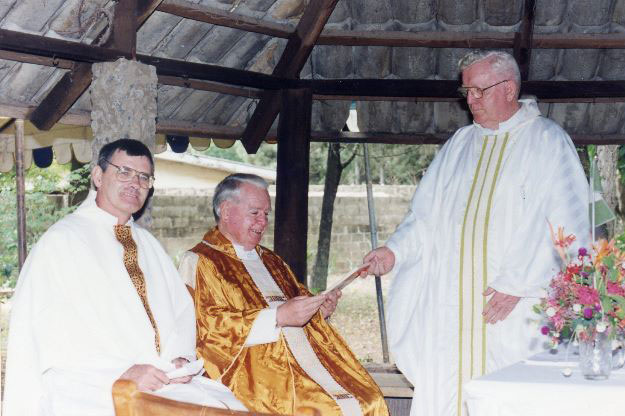
 At the end of the funeral Mass for Fr Sean Ryan his grandniece, Karen McKevitt, spoke on behalf of his relatives and friends about the man they knew as ‘Uncle Seán’. Karen concluded with a brief poem penned by a grandnephew of Fr Seán written several years about this missionary priest.
At the end of the funeral Mass for Fr Sean Ryan his grandniece, Karen McKevitt, spoke on behalf of his relatives and friends about the man they knew as ‘Uncle Seán’. Karen concluded with a brief poem penned by a grandnephew of Fr Seán written several years about this missionary priest.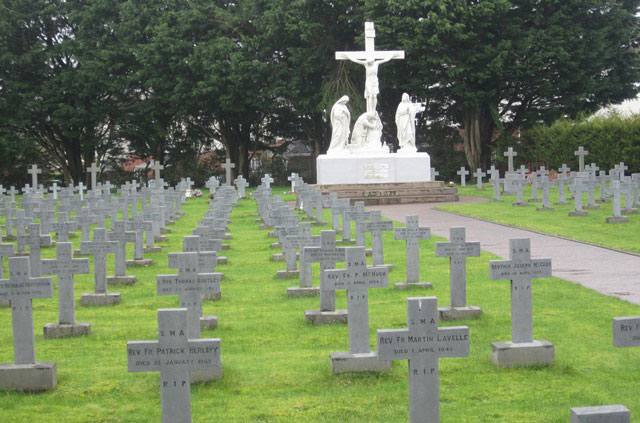
 Fr Sean’s remains returned to the African Missions, Blackrock Road at 5.30pm on Saturday, 22 February. The community and some of Fr Sean’s relatives were there to welcome him. Fr Colum O’Shea, the community Leader, received the remains, after which Evening Prayer for the Dead was recited. At 7pm, a classmate of Fr Sean, Fr John Flynn SMA, led the Rosary.
Fr Sean’s remains returned to the African Missions, Blackrock Road at 5.30pm on Saturday, 22 February. The community and some of Fr Sean’s relatives were there to welcome him. Fr Colum O’Shea, the community Leader, received the remains, after which Evening Prayer for the Dead was recited. At 7pm, a classmate of Fr Sean, Fr John Flynn SMA, led the Rosary. They were joined by Rt Rev Monsignor James Carroll VF (PP, St Peter’s, Drogheda), V Rev Sean Quinn (PP, Immaculate Conception, Louth Village) and V Rev Tommie McGeough and Drogheda parishioners who had travelled to pay their respects to a priest who had spent 12 happy years working alongside them in the Archdiocese of Armagh. After the ceremony all were invited to join the SMA Wilton community for light refreshments in the dining room. Monsignor Carroll and his parishioners had to return to Drogheda. The fact that they travelled down for the Removal was greatly appreciated by the family and the SMA.
They were joined by Rt Rev Monsignor James Carroll VF (PP, St Peter’s, Drogheda), V Rev Sean Quinn (PP, Immaculate Conception, Louth Village) and V Rev Tommie McGeough and Drogheda parishioners who had travelled to pay their respects to a priest who had spent 12 happy years working alongside them in the Archdiocese of Armagh. After the ceremony all were invited to join the SMA Wilton community for light refreshments in the dining room. Monsignor Carroll and his parishioners had to return to Drogheda. The fact that they travelled down for the Removal was greatly appreciated by the family and the SMA. The Readings for the Mass were read by Fr Sean’s great-grandniece, Kathryn Kennelly [Isaiah 25:6-9] and grand-niece Janet Traynor [Romans 14:7-15]. After reading from John 11:18-27, Fr Michael McCabe delivered his
The Readings for the Mass were read by Fr Sean’s great-grandniece, Kathryn Kennelly [Isaiah 25:6-9] and grand-niece Janet Traynor [Romans 14:7-15]. After reading from John 11:18-27, Fr Michael McCabe delivered his  Before the final prayer of the Mass, Karen McKevitt spoke in
Before the final prayer of the Mass, Karen McKevitt spoke in 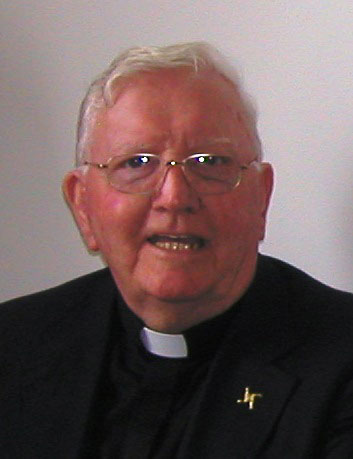
 The death has taken place of Fr Sean Ryan SMA at St Theresa’s Care Centre, African Missions, Blackrock Road, Cork. Fr Sean died in his sleep at 3.30am on 22 February, 2014. He will be buried, after 12 noon Concelebrated Funeral Mass, on Monday, 24 February.
The death has taken place of Fr Sean Ryan SMA at St Theresa’s Care Centre, African Missions, Blackrock Road, Cork. Fr Sean died in his sleep at 3.30am on 22 February, 2014. He will be buried, after 12 noon Concelebrated Funeral Mass, on Monday, 24 February. , the son of John and Mary (Macken). He was the 8th born in his family, having three step-sisters, three sisters and one brother. After completing his primary schooling he decided he wanted to be a missionary priest. And so he enrolled in the Sacred Heart College at Ballinafad, the secondary school run by the SMA in Co. Mayo. He spent one year there (1947-’48) and then went to the SMA College in Wilton, Cork, for three years before returning to Ballinafad, completing his Leaving Certificate exams in 1952.
, the son of John and Mary (Macken). He was the 8th born in his family, having three step-sisters, three sisters and one brother. After completing his primary schooling he decided he wanted to be a missionary priest. And so he enrolled in the Sacred Heart College at Ballinafad, the secondary school run by the SMA in Co. Mayo. He spent one year there (1947-’48) and then went to the SMA College in Wilton, Cork, for three years before returning to Ballinafad, completing his Leaving Certificate exams in 1952. When Warri diocese was created in 1964 Sean was the Parish Priest of Bomadi, which itself was divided from Warri on 17 March 1991. Fr Sean was to spend 31 years working in Warri diocese.
When Warri diocese was created in 1964 Sean was the Parish Priest of Bomadi, which itself was divided from Warri on 17 March 1991. Fr Sean was to spend 31 years working in Warri diocese. The Society had withdrawn from Issele-Uku several years before having adjudged that the local church was sufficiently well-established to ‘manage on its own’. Bishop Gbuji, in his wisdom, saw the benefit of having a ‘missionary’ presence in his diocese so that the local church of Issele-Uku would, in turn, become missionary to other parts of the world.
The Society had withdrawn from Issele-Uku several years before having adjudged that the local church was sufficiently well-established to ‘manage on its own’. Bishop Gbuji, in his wisdom, saw the benefit of having a ‘missionary’ presence in his diocese so that the local church of Issele-Uku would, in turn, become missionary to other parts of the world. Fr Sean retired to the African Missions in Dromantine. After his diagnosis of cancer he underwent several bouts of treatment but, through it all, never lost his steady, calm and cheerful spirit. He visited Cork several times for treatment. He returned to Dromantine before Christmas but it soon became clear he needed nursing care as his illness advanced. When he returned to Cork in January he knew that he was saying ‘goodbye’ to his family, friends and confreres in the north and that his time on earth was drawing to a close. And he was at peace with this.
Fr Sean retired to the African Missions in Dromantine. After his diagnosis of cancer he underwent several bouts of treatment but, through it all, never lost his steady, calm and cheerful spirit. He visited Cork several times for treatment. He returned to Dromantine before Christmas but it soon became clear he needed nursing care as his illness advanced. When he returned to Cork in January he knew that he was saying ‘goodbye’ to his family, friends and confreres in the north and that his time on earth was drawing to a close. And he was at peace with this.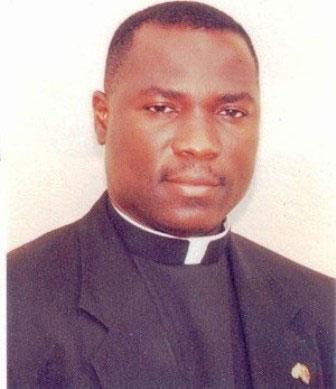

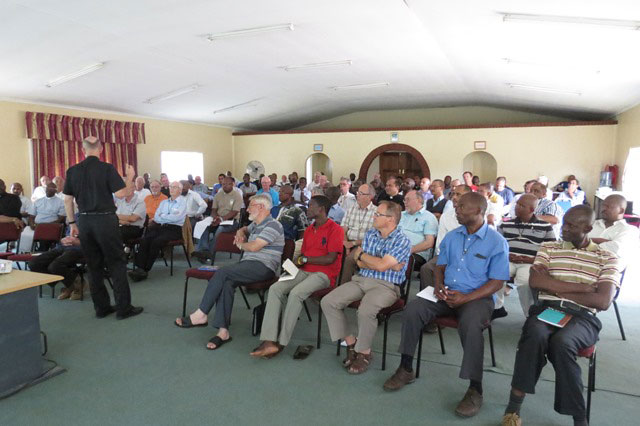

 purposeful life, a strong love for the sacraments, realistic self-image, healthy friendships, good self-care practices, positive view of celibacy and respect for religious authority. Detrimental factors under-mining priestly happiness included loneliness, anger management problems, sexual conflicts, low self-esteem and dysfunctional early life.
purposeful life, a strong love for the sacraments, realistic self-image, healthy friendships, good self-care practices, positive view of celibacy and respect for religious authority. Detrimental factors under-mining priestly happiness included loneliness, anger management problems, sexual conflicts, low self-esteem and dysfunctional early life.
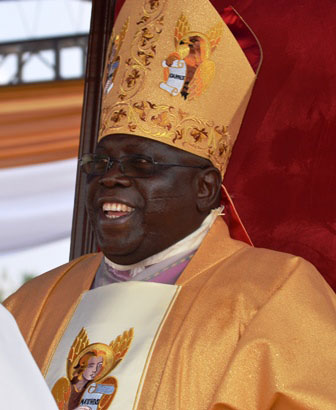
 With a light harmattan haze enveloping Ibadan, crowds converged from every direction on the grounds of SS Peter and Paul Seminary on Friday, 24 January 2014, for the installation of the second Archbishop of Ibadan, Most Rev Gabriel Abegunrin, former bishop of Oshogbo (pictured right).
With a light harmattan haze enveloping Ibadan, crowds converged from every direction on the grounds of SS Peter and Paul Seminary on Friday, 24 January 2014, for the installation of the second Archbishop of Ibadan, Most Rev Gabriel Abegunrin, former bishop of Oshogbo (pictured right).
 He lauded the spirit of Ibadan as a cosmopolitan city welcoming all comers where Christian and Muslims live in peace together. He spoke of it as a truly African city, unlike Lagos and Kaduna which he described as “colonial cities.”
He lauded the spirit of Ibadan as a cosmopolitan city welcoming all comers where Christian and Muslims live in peace together. He spoke of it as a truly African city, unlike Lagos and Kaduna which he described as “colonial cities.”
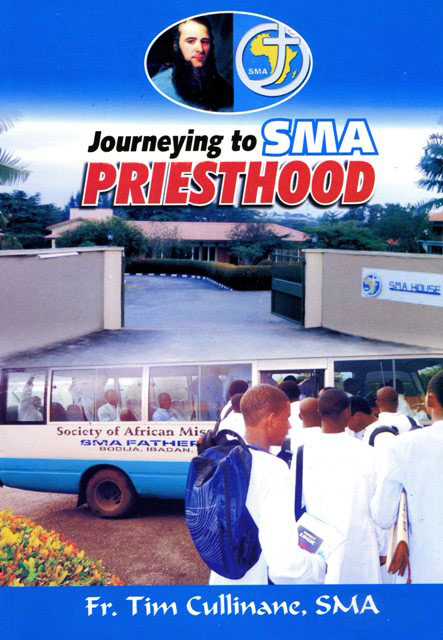
 “Much of what is contained within is not confined to SMA so it is a book of huge relevance to all those preparing for priesthood.”
“Much of what is contained within is not confined to SMA so it is a book of huge relevance to all those preparing for priesthood.”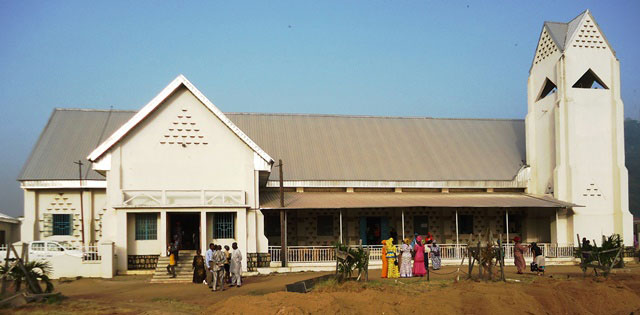


 These qualities were amply demonstrated on a number of occasions. Conscious of the need to generate income he devised a scheme which involved the establishment, despite strenuous efforts by British Government officials to prevent him, in 1908 of a commercial farm on a small island called Beaufort Island, situated on the Niger about 20 kilometres downstream from Lokoja. It proved, however, to be an ill-fated project and within a short time the island was flooded due to unexpectedly heavy rains and Fr Cermenati was forced to take refuge on a little spur of high ground. His cries for help were ignored by those opposed to the scheme in the first place and he was eventually rescued and brought to Asaba by a Muslim whose canoe came close to the island.
These qualities were amply demonstrated on a number of occasions. Conscious of the need to generate income he devised a scheme which involved the establishment, despite strenuous efforts by British Government officials to prevent him, in 1908 of a commercial farm on a small island called Beaufort Island, situated on the Niger about 20 kilometres downstream from Lokoja. It proved, however, to be an ill-fated project and within a short time the island was flooded due to unexpectedly heavy rains and Fr Cermenati was forced to take refuge on a little spur of high ground. His cries for help were ignored by those opposed to the scheme in the first place and he was eventually rescued and brought to Asaba by a Muslim whose canoe came close to the island.  Fr Hogan presents a copy of the book to Rt Rev Martin Dada Abejide Olorunmolu, Bishop of Lokoja diocese.
Fr Hogan presents a copy of the book to Rt Rev Martin Dada Abejide Olorunmolu, Bishop of Lokoja diocese.
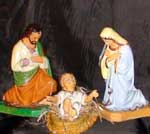
 A certain couple decided to have a party just before Christmas to celebrate the 80th birthday of the husband’s father. It was a great celebration and went on much later than expected. So the wife said:‘Let us leave everything and go to bed. Tomorrow we can sleep late and then we’ll clean up’. She struggled out of bed at 10 o’clock with everyone else still asleep. She had more or less just cleaned one room when the front doorbell sounded. The last thing she wanted was visitors with so much cleaning still to be done. When she opened the door there facing her was a family of five – a couple she had not seen for years and their 3 children plus a dog. ‘We were just passing by and decided to call in’. There was nothing else to do but to welcome them. Luckily she had just cleaned one room and put them inside. She gave them cups of tea and biscuits and then more tea and biscuits. They shared with each other how life had been since they last met. Eventually the visitors decided to leave saying their good-byes. Their last remark was: ‘Isn’t it great you have nothing else to do but to make cups of tea and entertain visitors’. As we can imagine she could have gladly strangled them but simply smiled.
A certain couple decided to have a party just before Christmas to celebrate the 80th birthday of the husband’s father. It was a great celebration and went on much later than expected. So the wife said:‘Let us leave everything and go to bed. Tomorrow we can sleep late and then we’ll clean up’. She struggled out of bed at 10 o’clock with everyone else still asleep. She had more or less just cleaned one room when the front doorbell sounded. The last thing she wanted was visitors with so much cleaning still to be done. When she opened the door there facing her was a family of five – a couple she had not seen for years and their 3 children plus a dog. ‘We were just passing by and decided to call in’. There was nothing else to do but to welcome them. Luckily she had just cleaned one room and put them inside. She gave them cups of tea and biscuits and then more tea and biscuits. They shared with each other how life had been since they last met. Eventually the visitors decided to leave saying their good-byes. Their last remark was: ‘Isn’t it great you have nothing else to do but to make cups of tea and entertain visitors’. As we can imagine she could have gladly strangled them but simply smiled.

 The Bushman is the collective name for the first peoples of Southern Africa many of whom still live today as hunter-gatherers as they have done for over 40,000 years. Africa, the cradle of humankind, is where the human story begins. In Africa we first walked upright. In Africa, a moment came when merely dividing of the spoils of the kill gave way to the first conversations around a camp fire. On African soil we celebrated our first supper together.
The Bushman is the collective name for the first peoples of Southern Africa many of whom still live today as hunter-gatherers as they have done for over 40,000 years. Africa, the cradle of humankind, is where the human story begins. In Africa we first walked upright. In Africa, a moment came when merely dividing of the spoils of the kill gave way to the first conversations around a camp fire. On African soil we celebrated our first supper together. ‘While going through the wild beauty of these mountains we saw in the setting sun, a great herd of cattle coming down the mountain slope and going home to the kraal on the opposite slope of the valley. There were two to three hundred head of cattle in the herd. It was most interesting to watch them going along, one after the other, in a living chain, from one hill, across the valley to the other, thus uniting, as it were, these two hills. A small twelve year old Motswana boy, wearing a buckskin coat, his forehead ornamented with a tuft of white feathers, which contrasted with the ebony black hair, was leading this herd of cattle. This scene, one of the finest I have seen, could well be painted by an artist.’
‘While going through the wild beauty of these mountains we saw in the setting sun, a great herd of cattle coming down the mountain slope and going home to the kraal on the opposite slope of the valley. There were two to three hundred head of cattle in the herd. It was most interesting to watch them going along, one after the other, in a living chain, from one hill, across the valley to the other, thus uniting, as it were, these two hills. A small twelve year old Motswana boy, wearing a buckskin coat, his forehead ornamented with a tuft of white feathers, which contrasted with the ebony black hair, was leading this herd of cattle. This scene, one of the finest I have seen, could well be painted by an artist.’

 The Simbang Masses are celebrated from 16th December to 24th December each morning at dawn, from 4am – hence the Mass is sometimes referred as “Misa de Gallo” (The Mass of the Rooster). Dawn has a symbolic character. It is a reminder that Christ is the Light who overcomes the darkness. Dawn too is a reminder of the penitential nature of Advent when people are encouraged to make some sacrifices by getting up early. These Masses form a nine-day Christmas Novena.
The Simbang Masses are celebrated from 16th December to 24th December each morning at dawn, from 4am – hence the Mass is sometimes referred as “Misa de Gallo” (The Mass of the Rooster). Dawn has a symbolic character. It is a reminder that Christ is the Light who overcomes the darkness. Dawn too is a reminder of the penitential nature of Advent when people are encouraged to make some sacrifices by getting up early. These Masses form a nine-day Christmas Novena. 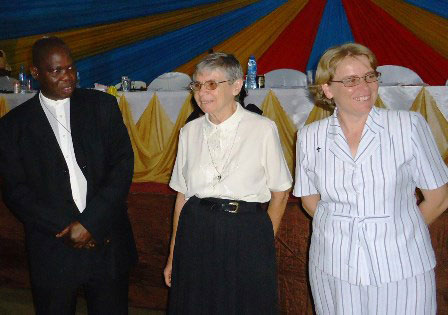

 The diocesan newspaper – The Cross News – wrote of her, under the headline: THE FALCON FLIES AWAY
The diocesan newspaper – The Cross News – wrote of her, under the headline: THE FALCON FLIES AWAY

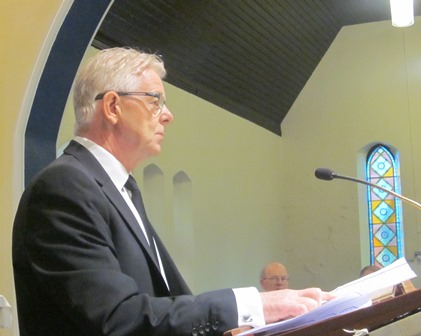

 At the end of the Funeral Mass, a nephew of Fr Tom Mullahy, Padraic Fahey, spoke on behalf of the family about his uncle.
At the end of the Funeral Mass, a nephew of Fr Tom Mullahy, Padraic Fahey, spoke on behalf of the family about his uncle. I had the pleasure of moving Fr. Tom from his parish in Limerick to the SMA House in Claregalway. I came prepared with Car and trailer and lots of boxes. Little did I know!
I had the pleasure of moving Fr. Tom from his parish in Limerick to the SMA House in Claregalway. I came prepared with Car and trailer and lots of boxes. Little did I know!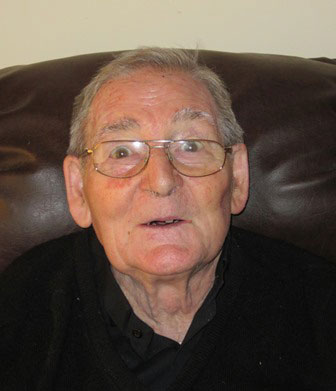
 The members of the Society of African Missions are mourning the death of their confrere, Fr Tom Mullahy, which took place at 4.55am on Thursday, 5 December 2013. He died peacefully in the care of the nursing staff at the St Theresa’s Care Centre at the African Missions, Blackrock Road, Cork.
The members of the Society of African Missions are mourning the death of their confrere, Fr Tom Mullahy, which took place at 4.55am on Thursday, 5 December 2013. He died peacefully in the care of the nursing staff at the St Theresa’s Care Centre at the African Missions, Blackrock Road, Cork.

 After a period at home regaining his physical strength, Fr Tom joined the SMA Promotion team based in Dublin. After five years ‘on the road’ Fr Tom returned to his great love: pastoral work. Limerick diocese, under the last Bishop Jeremiah Newman, had an agreement with the Society to receive some diocesan priests to work alongside SMA priests in Nigeria. In a form of ‘reverse mission’ Fr Tom went to work in Limerick diocese for sixteen years, where he served in three parishes: St Munchin’s, Monaleen and Donoughmore. During his 12 years in St Munchin’s he also served as Chaplain to St Camillus Hospital, a ministry which made huge demands on him. He then moved to Monaleen for two years before his transfer to Donoughmore from which a return of ill health forced a decision by Fr Tom and his SMA Superiors to recognize the inevitable, and so he retired to the SMA House in Claregalway, Co Galway.
After a period at home regaining his physical strength, Fr Tom joined the SMA Promotion team based in Dublin. After five years ‘on the road’ Fr Tom returned to his great love: pastoral work. Limerick diocese, under the last Bishop Jeremiah Newman, had an agreement with the Society to receive some diocesan priests to work alongside SMA priests in Nigeria. In a form of ‘reverse mission’ Fr Tom went to work in Limerick diocese for sixteen years, where he served in three parishes: St Munchin’s, Monaleen and Donoughmore. During his 12 years in St Munchin’s he also served as Chaplain to St Camillus Hospital, a ministry which made huge demands on him. He then moved to Monaleen for two years before his transfer to Donoughmore from which a return of ill health forced a decision by Fr Tom and his SMA Superiors to recognize the inevitable, and so he retired to the SMA House in Claregalway, Co Galway.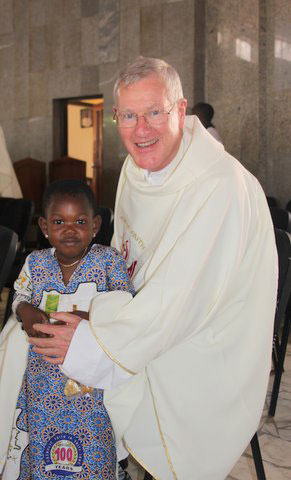
 Fr Des Corrigan recently returned from the concluding ceremonies marking the coming the Catholic Faith to Ekitiland in western Nigeria. There was much to celebrate and the Catholics of Ekiti put on a memorable and joyful celebration. Fr Corrigan witnessed, not for the first time, the way Nigerians celebrate and give thanks to God for His blessings. “When it comes to celebrating significant events no effort or expense is spared”, he states. Here is an edited version of his article.
Fr Des Corrigan recently returned from the concluding ceremonies marking the coming the Catholic Faith to Ekitiland in western Nigeria. There was much to celebrate and the Catholics of Ekiti put on a memorable and joyful celebration. Fr Corrigan witnessed, not for the first time, the way Nigerians celebrate and give thanks to God for His blessings. “When it comes to celebrating significant events no effort or expense is spared”, he states. Here is an edited version of his article. There have been many events over the past year celebrating that growth but the Grand Finale was a Mass in St. Patrick’s Cathedral, Ado-Ekiti on 19th Oct. 2013.
There have been many events over the past year celebrating that growth but the Grand Finale was a Mass in St. Patrick’s Cathedral, Ado-Ekiti on 19th Oct. 2013. The bishops and the guests were accommodated in the Ekiti diocesean pastoral centre which has 75 en-suite rooms. On the previous evening Bishop Ajakaye hosted a big celebratory dinner for invited guests. Our photo shows him greeting Fr Eddie Hartnett SMA who has been a missionary in the Archdicoese of Lagos for 46 years.
The bishops and the guests were accommodated in the Ekiti diocesean pastoral centre which has 75 en-suite rooms. On the previous evening Bishop Ajakaye hosted a big celebratory dinner for invited guests. Our photo shows him greeting Fr Eddie Hartnett SMA who has been a missionary in the Archdicoese of Lagos for 46 years.



 I am grateful for the opportunity I had to represent the Irish Province at the celebrations. I am very grateful to Bishop Ajakaye, Bishop Fagun, the priests and people of Ekiti for the really warm welcome I received. I also want to express my thanks to SMA colleagues, Fathers Edward Muge and Tim Cullinane and the staff and students of the SMA Formation House, Ibadan for their hospitality and kindness.
I am grateful for the opportunity I had to represent the Irish Province at the celebrations. I am very grateful to Bishop Ajakaye, Bishop Fagun, the priests and people of Ekiti for the really warm welcome I received. I also want to express my thanks to SMA colleagues, Fathers Edward Muge and Tim Cullinane and the staff and students of the SMA Formation House, Ibadan for their hospitality and kindness. 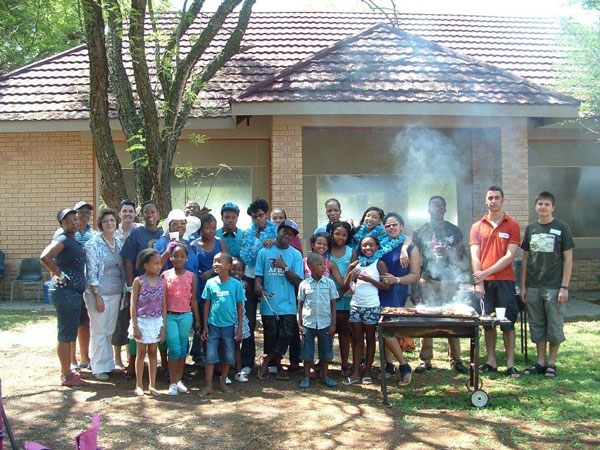



 From the start of our stay we were straight into work, which we began in
From the start of our stay we were straight into work, which we began in  getting to know them and this was something the group really enjoyed. It was hard to imagine that these young boys, not much younger than us, had suffered so much in their lives. The youngest in the Shelter was only eight years old. FSC also have a girls shelter which takes in young girls from the streets.
getting to know them and this was something the group really enjoyed. It was hard to imagine that these young boys, not much younger than us, had suffered so much in their lives. The youngest in the Shelter was only eight years old. FSC also have a girls shelter which takes in young girls from the streets.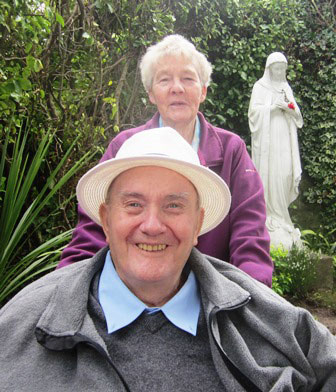
 Liam was the eldest of six children: Martin, Maureen Prisciak (Canada), Seán (died 1980), Sr Breda (Mercy Congregation) and Tommy. He attended The Rower National School and did his secondary studies (1941-1946) at the Good Counsel College, New Ross.
Liam was the eldest of six children: Martin, Maureen Prisciak (Canada), Seán (died 1980), Sr Breda (Mercy Congregation) and Tommy. He attended The Rower National School and did his secondary studies (1941-1946) at the Good Counsel College, New Ross. Fr Liam was deeply committed to community development. In 1958 he attended an international conference at the University of Ghana (Legon) on this matter which brought together many stakeholders, including the UN and other international agencies. He returned to Kaduna energised to do all he could to facilitate community development. His administrative skills were a great help to him in this. In 1965 he wrote a long letter to Fr Creaven, Irish Provincial Superior entitled ‘The Catholic Church and community development in northern Nigeria’. He wrote that his work was “aimed at stimulating village people towards self-help in raising their standard of living.”
Fr Liam was deeply committed to community development. In 1958 he attended an international conference at the University of Ghana (Legon) on this matter which brought together many stakeholders, including the UN and other international agencies. He returned to Kaduna energised to do all he could to facilitate community development. His administrative skills were a great help to him in this. In 1965 he wrote a long letter to Fr Creaven, Irish Provincial Superior entitled ‘The Catholic Church and community development in northern Nigeria’. He wrote that his work was “aimed at stimulating village people towards self-help in raising their standard of living.”
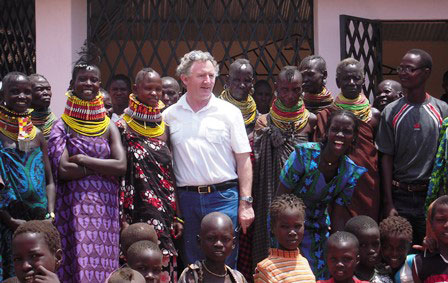
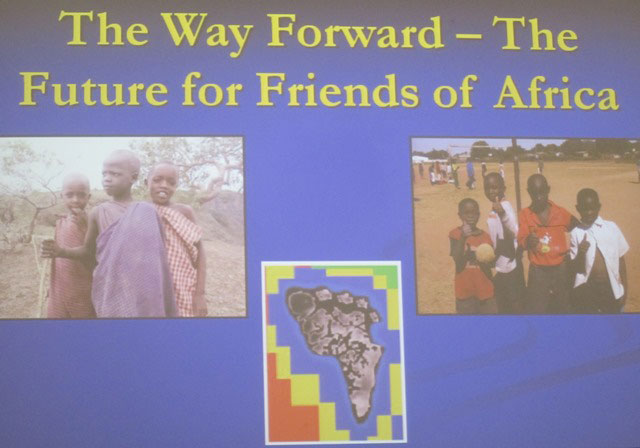
 bility in the projects in which they are involved. Facing into the future, conscious of the changing SMA and FOA realities in Ireland and Africa, it is important that there are clear agreements between all parties so that the work undertaken achieves the best possible result.
bility in the projects in which they are involved. Facing into the future, conscious of the changing SMA and FOA realities in Ireland and Africa, it is important that there are clear agreements between all parties so that the work undertaken achieves the best possible result. long-termer Anita McWilliams. And even though not listed here they each made a particular contribution to the FOA project in Zambia.
long-termer Anita McWilliams. And even though not listed here they each made a particular contribution to the FOA project in Zambia. The first group went to Zambia in 2001. Six years later STVs headed for South Africa and in 2008 Tanzania received their first group. Up to now 212 short-term volunteers have served in Africa. Many of the early STVs were in third-level education. But responding to a demand to facilitate second-level students FOA began a programme for school groups. This began in 2010 and the FOA now has formal links with four schools – Holy Trinity (Cookstown), St Pat’s (Armagh and Dungannon) and Sacred Heart, Newry.
The first group went to Zambia in 2001. Six years later STVs headed for South Africa and in 2008 Tanzania received their first group. Up to now 212 short-term volunteers have served in Africa. Many of the early STVs were in third-level education. But responding to a demand to facilitate second-level students FOA began a programme for school groups. This began in 2010 and the FOA now has formal links with four schools – Holy Trinity (Cookstown), St Pat’s (Armagh and Dungannon) and Sacred Heart, Newry. Anita McWilliams has been in Zambia since November 2012 and is involved with the
Anita McWilliams has been in Zambia since November 2012 and is involved with the 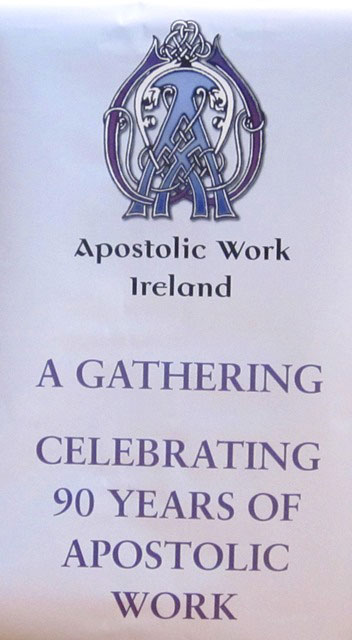
 The Society of Apostolic Work was founded in 1923 by Agnes McAuley and a small band of young women who gathered in Belfast with the purpose of helping missionaries in whatever way they could – by prayer and material assistance. They began by providing Mass vestments and other things needed by the missionaries. But quite quickly they began raising funds to send to the missionaries so that they could use it to fund their work, as most of them were working with the very poor, in Africa, Asia and South America.
The Society of Apostolic Work was founded in 1923 by Agnes McAuley and a small band of young women who gathered in Belfast with the purpose of helping missionaries in whatever way they could – by prayer and material assistance. They began by providing Mass vestments and other things needed by the missionaries. But quite quickly they began raising funds to send to the missionaries so that they could use it to fund their work, as most of them were working with the very poor, in Africa, Asia and South America. Province. Nearly 200 Apostolic members came from Armagh, Down & Connor and Kilmore to celebrate a Thanksgiving Mass and have a meal afterwards.
Province. Nearly 200 Apostolic members came from Armagh, Down & Connor and Kilmore to celebrate a Thanksgiving Mass and have a meal afterwards.  The theme for Mrs O’Loan was the ‘Relevance of Apostolic Work in the developing world today’. Mrs O’Loan spoke of the different facets of her work and especially of her work in Africa which she has visited several times to share her experience of being Police Ombudsman in Northern Ireland. In Timor Leste as well as in Sierra Leone and other African countries she met missionaries who were making good use of the materials sent to them from Apostolic branches in Ireland. Throughout her presentation it was obvious that all she does is suffused with a deep faith and commitment to the social teachings of the Church.
The theme for Mrs O’Loan was the ‘Relevance of Apostolic Work in the developing world today’. Mrs O’Loan spoke of the different facets of her work and especially of her work in Africa which she has visited several times to share her experience of being Police Ombudsman in Northern Ireland. In Timor Leste as well as in Sierra Leone and other African countries she met missionaries who were making good use of the materials sent to them from Apostolic branches in Ireland. Throughout her presentation it was obvious that all she does is suffused with a deep faith and commitment to the social teachings of the Church.
 In the afternoon, Bishop Kieran O’Reilly (pictured) spoke on the theme: Mission going forward with reference to Church teaching. He began his address to the Congress by reminding us that part of the Irish identity as missionaries includes non-Roman Catholic missionaries. “We were not the only ones who went from here with the sense of the gift of faith which we as a people had received.”
In the afternoon, Bishop Kieran O’Reilly (pictured) spoke on the theme: Mission going forward with reference to Church teaching. He began his address to the Congress by reminding us that part of the Irish identity as missionaries includes non-Roman Catholic missionaries. “We were not the only ones who went from here with the sense of the gift of faith which we as a people had received.”






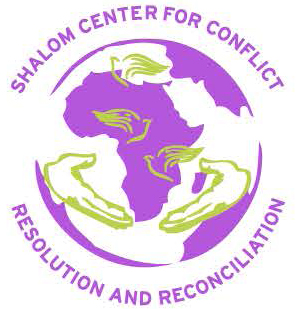
 As time went by SCCRR’s remit broadened to include the eight country regional development organisation known as IGAD (Intergovernmental Authority on Development). This region is an area characterized by long-standing episodes of violent conflict between members of different ethnic communities. As time went by SCCRR’s remit broadened to include the eight country regional development organisation known as IGAD (Intergovernmental Authority on Development). This region is an area characterized by long-standing episodes of violent conflict between members of different ethnic communities.
As time went by SCCRR’s remit broadened to include the eight country regional development organisation known as IGAD (Intergovernmental Authority on Development). This region is an area characterized by long-standing episodes of violent conflict between members of different ethnic communities. As time went by SCCRR’s remit broadened to include the eight country regional development organisation known as IGAD (Intergovernmental Authority on Development). This region is an area characterized by long-standing episodes of violent conflict between members of different ethnic communities.



 CHILDREN AND SCHOOLS
CHILDREN AND SCHOOLS


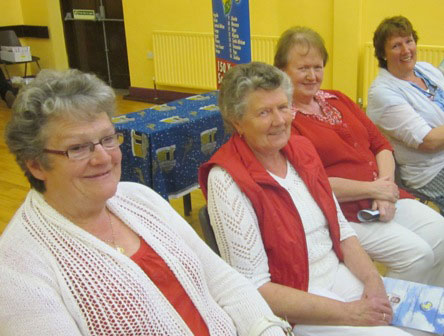






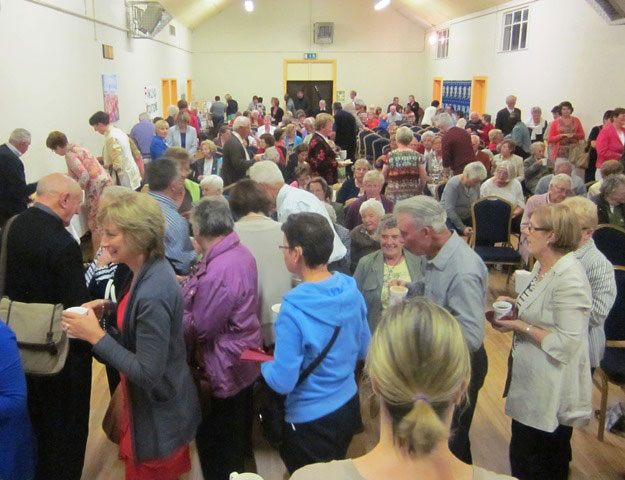




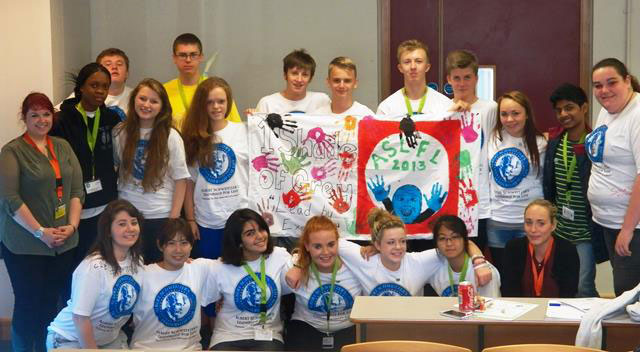


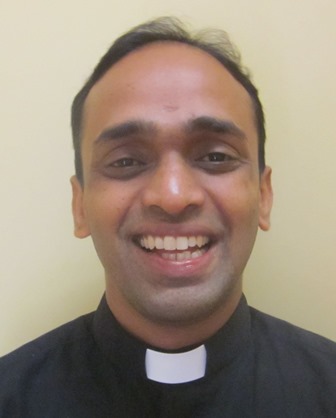
 Fr Dominic Maria Anthuvan was born in Salem, Tamil Nadu, India in September 1980, the 2nd of three children. Even though India still has a great need for priests, Fr Dominic wanted to be a missionary because he was moved by what he knew of the SMA and he always wanted to become one. A cousin, Fr Francis Rozario, was already an SMA priest and this too had its influence on him (Fr Rozario is now a member of the SMA General Council in Rome). For the young Dominic, Africa has a greater need of missionaries and it was a matter of “it’s now or never.”
Fr Dominic Maria Anthuvan was born in Salem, Tamil Nadu, India in September 1980, the 2nd of three children. Even though India still has a great need for priests, Fr Dominic wanted to be a missionary because he was moved by what he knew of the SMA and he always wanted to become one. A cousin, Fr Francis Rozario, was already an SMA priest and this too had its influence on him (Fr Rozario is now a member of the SMA General Council in Rome). For the young Dominic, Africa has a greater need of missionaries and it was a matter of “it’s now or never.” He joined the SMA in 1998 doing his Philosophy studies in India, followed by an International Spiritual Year programme in the Philippines. He became an SMA member in June 1998 and was then sent to Nigeria for his pastoral training. Fr Dominic completed his theological studies in Nairobi, Kenya. He was ordained a priest on 8 August 2009, one of 5 Indian SMA priests ordained that year.
He joined the SMA in 1998 doing his Philosophy studies in India, followed by an International Spiritual Year programme in the Philippines. He became an SMA member in June 1998 and was then sent to Nigeria for his pastoral training. Fr Dominic completed his theological studies in Nairobi, Kenya. He was ordained a priest on 8 August 2009, one of 5 Indian SMA priests ordained that year. 



 Four Irish SMA priests are buried there, the first of them – Fr Michael O’Carroll from Hospital, Co Limerick – died at the age of 29 years in 1881.
Four Irish SMA priests are buried there, the first of them – Fr Michael O’Carroll from Hospital, Co Limerick – died at the age of 29 years in 1881. 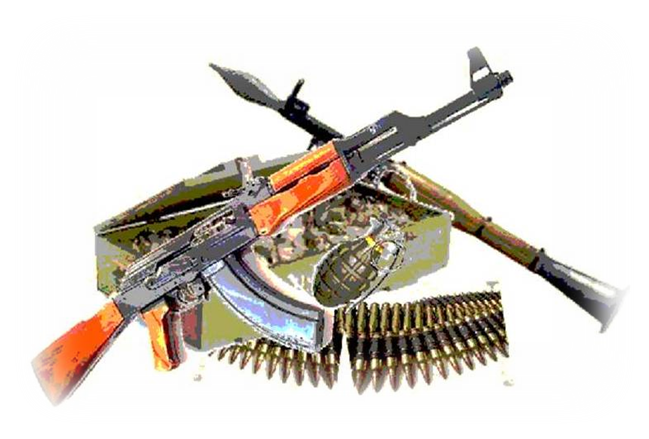
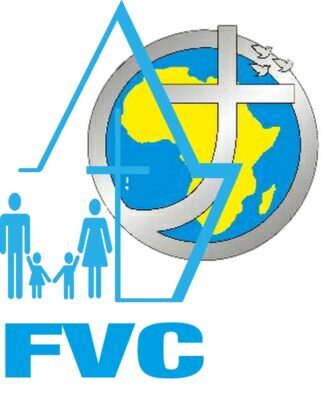
 Each year, the Vatican issues a message to Muslims, to mark the end of Ramadan. This year Pope Francis has personally signed it himself “as an expression of esteem and friendship for all Muslims, especially those who are religious leaders.” In his message Pope Francis called for more education to promote mutual respect between Islam and Christianity.
Each year, the Vatican issues a message to Muslims, to mark the end of Ramadan. This year Pope Francis has personally signed it himself “as an expression of esteem and friendship for all Muslims, especially those who are religious leaders.” In his message Pope Francis called for more education to promote mutual respect between Islam and Christianity.



